
















































Creating an elegant and luxurious bag drop area is as simple as furnishing it with Landmark Golf Course Products. Our goods are made from sturdy Rinowood™, a beautiful and dense hardwood, to stand the test of time and help elevate your course and clubhouse to a world-class property.













Rinowood.com






































1-888-337-7677

Greet guests in style with our podiums, which can be tailored specifically to your clubhouse. Choose from multiple designs, material combinations, and personalized logo options. Plus, all models have shelved storage and umbrella-ready options—see below for more.

Finish your entrance with flair. Our umbrellas come in different sizes, finishes, and base options—as well as hundreds of colors and patterns.
Make it easy for members and guests to drop off and pick up their bags. Each one is available in multiple stall sizes and designs, and can be customized with your logo.


Editorial Staff For Club + Resort Business
EDITOR
Rob Thomas rthomas@wtwhmedia.com
216-316-5294
1111 Superior Ave., 26th Floor Cleveland, OH 44114
SENIOR EDITOR
Phil Keren pkeren@wtwhmedia.com 216-399-9069
CONTRIBUTING EDITORS
Course + Grounds:
Betsy Gilliland
Jeff Bollig
Design + Renovation:
Pamela Brill
Food + Beverage: Marilyn Odesser-Torpey
Editorial Staff For Club + Resort Chef
EDITOR
Joanna DeChellis jdechellis@wtwhmedia.com 412-260-9233
SENIOR EDITOR
Isabelle Gustafson igustafson@wtwhmedia.com 216-296-2041
CONTRIBUTING EDITORS
Pamela Brill
Lauren Newman
Robert Mancuso, CMC, DipWSET
Creative Services
VP, CREATIVE SERVICES
Mark Rook mrook@wtwhmedia.com
CREATIVE DIRECTOR
Erin Canetta ecanetta@wtwhmedia.com
SENIOR ART DIRECTOR
Matthew Claney mclaney@wtwhmedia.com
DIRECTOR, AUDIENCE DEVELOPMENT
Bruce Sprague bsprague@wtwhmedia.com
Production services
CUSTOMER SERVICE MANAGER
Stephanie Hulett shulett@wtwhmedia.com

CUSTOMER SERVICE REPRESENTATIVE
Jane Cooper jcooper@wtwhmedia.com
Leadership Team
MANAGING DIRECTOR
Scott McCafferty smccafferty@wtwhmedia.com
CO/FOUNDER, VP SALES

Mike Emich memich@wtwhmedia.com
EVP
Marshall Matheson mmatheson@wtwhmedia.com
Sales Team
PUBLISHER
John Petersen jpetersen@wtwhmedia.com 216-346-8790
SALES DIRECTOR
Tony Bolla tbolla@wtwhmedia.com 773-859-1107
REGIONAL SALES MANAGER
Ashley Burk aburk@wtwhmedia.com
REGIONAL SALES MANAGER
Jake Bechtel jbechtel@wtwhmedia.com 440-465-1914
REGIONAL SALES MANAGER
Patrick McIntyre pmcintyre@wtwhmedia.com 216-372-8112
Finance
CONTROLLER
Brian Korsberg bkorsberg@wtwhmedia.com
ACCOUNTS RECEIVABLE SPECIALIST

Jamila Milton jmilton@wtwhmedia.com
Video Services
VIDEOGRAPHER
Garrett McCafferty gmccafferty@wtwhmedia.com
VIDEO EDITOR
Kara Singleton ksingleton@wtwhmedia.com
Digital Media/Web/Development
VP, DIGITAL MARKETING
Virginia Goulding vgoulding@wtwhmedia.com
DIGITAL MARKETING MANAGER
Taylor Meade tmeade@wtwhmedia.com
DIGITAL PRODUCTION MANAGER
Reggie Hall rhall@wtwhmedia.com
DIGITAL MEDIA SPECIALIST

Nicole Lender nlender@wtwhmedia.com

DIGITAL PRODUCTION/ MARKETING DESIGNER
Samantha King sking@wtwhmedia.com
MARKETING GRAPHIC DESIGNER
Hannah Bragg hbragg@wtwhmedia.com
VP STRATEGIC INITIATIVES
Jay Hopper jhopper@wtwhmedia.com
WEBINAR COORDINATOR Halle Kirsh hkirsh@wtwhmedia.com
WEBINAR COORDINATOR Kim Dorsey kdorsey@wtwhmedia.com
DEVELOPMENT MANAGER
Dave Miyares dmiyares@wtwhmedia.com
SR. DIGITAL MEDIA MANAGER
Pat Curran pcurran@wtwhmedia.com
Events
EVENTS MANAGER
Jen Osborne josborne@wtwhmedia.com
EVENTS MANAGER Brittany Belko bbelko@wtwhmedia.com
EVENT MARKETING SPECIALIST Olivia Zemanek ozemanek@wtwhmedia.com
EVENT COORDINATOR Alexis Ferenczy aferenczy@wtwhmedia.com
Club + Resort Chef Editorial Advisory Committee
James Allen, CEC Executive Chef, Blackthorn Club at the Ridges Jonesborough, Tenn.
Lance Cook, WCMC, CEC, CCA, CFBE, FMP, CFSM Executive Chef, Hammock Dunes Club Palm Coast, Fla.
K. Scott Craig, CEC, CCA, WCMC Executive Chef, Cullasaja Club Highlands, N.C.
Laura Herman, CEPC Executive Pastry Chef, Shoreacres Lake Bluff, Ill.
Vincent Horville Executive Chef, The Metropolitan Club of the City of Washington (D.C.)
Michael Matarazzo, CEC Executive Chef, Farmington CC, Charlottesville, Va.
Robert Meitzer, CEC, CCA Executive Chef, Forest Lake Club Columbia, S.C.
Tim Recher, CEC, AAC, CWX Director of Culinary Operations, Quail West G&CC Naples, Fla.
Scott Ryan, CEC, AAC, Executive Chef, The Country Club Pepper Pike, Ohio
J. Kevin Walker, CMC, AAC
14









The Club at Chatham Hills in Westfield, Ind., is an amenity-rich property with a pair of Pete Dye designs and a wealth of non-traditional options for members.. (Photo by The Club at Chatham Hills)

ALSO IN THIS ISSUE


6 The Rob Report THE LION AND THE LAMB


8 Clubhouse Notes C+RB IS ON THE AIR IN 2023
20 Design + Renovaton TAKING A DEEP DIVE INTO POOL REDESIGN Clubs get into the swim of things by updating pools in time for the season.

24 Snapshot RENOVATION RIGHT UP MEMBERS’ ALLEY
Tying together its bowling alley and social space boosts the DAC experience.

10 Management TO SHUTTER, OR NOT TO SHUTTER


11 Racquet Operations A GLANCE BACKWARD TO UNDERSTAND THE PATHWAY AHEAD


12 Membership + Marketing ASK MAX

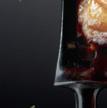


13 Golf + Fitness Technology FIGURE OUT WHICH TECHNOLOGY TO USE
EXPERIENCES 2023 Top Ranked





WHEN I WAS GROWING up, my mother liked to use the lion/lamb proverb, as in “March comes in like a Lion and goes out like a Lamb.” Being a golfer in Northeast Ohio’s “snowbelt” region, I used it as hope that I’d be playing by the end of March.






Turns out, the saying may not have anything to do with the weather. Instead, it most likely started as a reference to astronomy, referencing the position of the constellations Leo (a lion) and Aries (a ram, or lamb) in the night sky.
Still, when a blizzard would dump a foot of snow on us at the end of February or beginning of March, I’d take solace in the possibility of the lamb—and spring— being only a few weeks away.
As an adult, I still watch the weather, but now I long for spring simply because I hate being cold and get no enjoyment from snow. I should’ve taken up skiing years ago, but missed that window and just want to be warm.
As you likely know, we put out a daily newsletter Monday through Friday. If you haven’t already, check out our website and subscribe. To prepare those newsletters, we scroll through our inboxes and scour the Web each morning to find news that our readers would find interesting. We’re entering the period of countless headlines reading “(Insert Name Here) Golf Club Opening.” Those used to catch my eye—thinking we had a new course to cover—but now I know it’s just one of many coming out of its winter hibernation.





Don’t get me wrong, I still like reading those articles because I know spring is upon us and those course operators will soon be welcoming golfers and filling up tee sheets. And every day there’s a handful of new golfers being introduced to the sport I love. The more, the merrier!

We’re all 0-0 to start the 2023 season. What have you done during the offseason to improve your standing in the area?
And there’s still value to be had in those articles. Many of those clubs opening for the season are introducing renovations and/or enhancements for the upcoming season. Take my neighborhood club, for instance. StoneWater Golf Club will have an indoor/outdoor fitting and instruction studio this year.
When all the snow melts from the recent winter storm in Minnesota, members of Austin (Minn.) Country Club will enjoy the culmination of a $5 million, three-phase project that transformed the clubhouse. Work addressed many areas of the facility, including dining, retail, event space and deferred maintenance.
The club’s new restaurant and bar named “Bunkers” has a casual/modern feel and includes a state-of-the-art golf simulator and lounge area adjacent to the space. During the project, crews completed a full refresh of the club’s golf shop, as well. The renovation also enhanced the event space for hosting up to 300 guests for weddings, recep-
tions, class reunions, meetings, seminars, lunches, and dinners to anyone in the surrounding area.

Not everything will be extravagant … or even get noticed. A fresh coat of paint, refinished floors or expanded kitchen can go a long way to enhance the member/ guest experience. A new grill won’t be seen, but those cheeseburgers are certainly going to be appreciated.
As a Cleveland sports fan, I was taught to enjoy the beginning of a new season. Everyone is 0-0 and has a chance to win the Super Bowl or World Series. The Cavaliers gave us an NBA championship in 2016, but that celebration will pale in comparison if the Guardians win it all. And God help us if the Browns hoist the Lombardi Trophy!
So we’re all 0-0 to start the 2023 season. What have you done during the offseason to improve your standing in the area? Shoot me an e-mail and tell me about the new roof on the clubhouse, or resort-style pool that’s scheduled to open for Memorial Day weekend. Send pictures … we love pictures.
And let’s all hope March goes out like a lamb so April 1 won’t treat us like fools.
Rob Thomas rthomas@wtwhmedia.com








Prior to co-founding Club Caddie, two golf course owners/operators with technology backgrounds partnered together and resolved to build superior golf course management software.






Today, Club Caddie’s mission is to make cloud-based software accessible to every daily fee and semiprivate golf course by way of an affordable and transparent monthly fee.





What makes Club Caddie a better option? We literally speak your language. Every aspect of Club Caddie is built and tested by PGA professionals, Food and Beverage Directors, Event Coordinators GM’s, and Revenue Managers before it’s rolled out.
Award-Winning, All in One, Golf Technology. Cost-effective, cloud-based and simple to use course management software built by golf industry professionals. Includes: Retail, F/B and Mobile Point of Sale, Tee Sheet, Starter Sheet, Activity and Lesson Booking, Venue Management, Event Management, Customer Marketing, Full Member Module, On-Demand F/B Ordering, Full suite of BI and Accounting Reports.


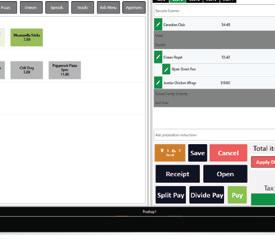




Club Caddie
18720 Mack Ave. Suite 210
Grosse Pointe, MI 48236

www.clubcaddie.com

Websites that look good on any browser or mobile phone, accessible in search results, with content that you can easily manage by uploading pictures and text.
 Course Branded Mobile Application includes GPS, Scorecard, Tee-Times Reservations, Course Information, Event Updates, and much more...
Built by Golf Course Owners
Course Branded Mobile Application includes GPS, Scorecard, Tee-Times Reservations, Course Information, Event Updates, and much more...
Built by Golf Course Owners


career working in radio broadcasting at an AM news/talk station in Michigan. I primarily worked behind the scenes as a producer and board operator, but I occasionally delivered the news on the air and even filed some reports from the field. I also worked as a sideline reporter for high school football broadcasts. There was rarely a dull moment and I typically experienced an adrenaline rush when delivering a live news report.
About two decades ago, I switched to print journalism because I liked writing and felt there were more opportunities available in newspaper and magazine work. While I’ve enjoyed my time in this field, I recall my five years in radio broadcasting with a lot of pride. Now and then, I still have the itch to sit by a microphone and start talking.
The good news is my position here at Club + Resort Business is opening the door for me to be “on the air” again, albeit in a more 21st century style. Last year, I joined C+RB Editor Rob Thomas as a panelist on a podcast called Club + Resort Talks. Prior to my joining C+RB in April of 2022, Rob had already been doing the podcasts. On one of the episodes, Rob interviewed legendary golfer Gary Player. Given my past work in radio broadcasting, I was excited to join Rob on the podcast.
Rob and I put together a few episodes in 2022, but we are now making a more concerted effort to have the podcast become a regular, ongoing feature on our website at clubandresortbusiness.com. The podcast is typically 20-25 minutes long and consists of two segments. Rob and I spend the first 8-10 minutes discussing recent news stories in the club and resort industry, and then the program transitions to a previously recorded interview conducted by one of us. Our
guests have been: Brian Friederichs, CEO of Capstone Hospitality; Jarred Gomez, Marketing Manager of KemperSportsPortland Region; Greg Gilg, General Manager of Field Club of Omaha in Omaha, Neb.; and Joe Meglen, Director of Player Development at StoneWater Golf Club in Highland Heights, Ohio.


Friederichs discussed the top issues that clubs should think about when trying to attract new members. Gomez shared information about YA! Golf PDX, a social golf community designed for twenty-somethings. Gilg talked about his club’s successful initiative of offering complimentary golf lessons to golf members in an effort to boost membership. Meglen discussed his strategies for
bringing newcomers to golf, as well as longtime players who took a hiatus but were now looking to return to the game.

Club + Resort Talks also had its first non-human guests. A recent episode featured a video taken by Rob of a Flyaway Geese demonstration that happened during the Golf Course Superintendents Association of America Conference and Trade Show in Orlando, Fla., in February. The presentation showed how the geese help train dogs to keep geese, ducks and other creatures off golf courses. It was fun to watch and it was great to share the footage with our audience.
As the year unfolds, Rob and I will continue to produce more episodes of Club + Resort Talks that will feature conversations with country club general managers, head golf pros and other people in the industry. We are taking a flexible approach to the program, but I think we will develop a clearer identity for the show as time moves along. That said, Rob and I welcome suggestions for guests and topics for upcoming installments of Club + Resort Talks. If you would like to offer some ideas, feel free to email us at pkeren@wtwhmedia.com or rthomas@wtwhmedia.com.
Phil Keren • Senior Editor pkeren@wtwhmedia.com










The good news is my position here at Club + Resort Business is opening the door for me to be “on the air” again, albeit in a more 21st century style.
“We looked at several di erent platforms, and no one else came close to Clubessential in meeting the features and functionalities we were looking for.”
 Mike Lee, University Yacht Club Member & Board Technology Consultant
Mike Lee, University Yacht Club Member & Board Technology Consultant
Clubessential’s All-in-One Essential Suite provides everything you need to recruit, engage, and retain your members – for life. From member loyalty to back-end operational e iciency, the Essential Suite satisfies every challenge a multi-faceted club faces.
RECRUIT
Rapidly identify, vet, and automate processes CE CRM tracks contacts automatically through the sales funnel
ENGAGE
Safely satisfy touchless and spacing expectations Drive meaningful sta /member interactions with Member Preferences
RETAIN
Utilize the Membership Analytics Predictor for data-driven member insights Score members based on activity, money spent, reservations, and more
OPERATE
Work smarter with automated processes, intelligent business systems, and AI Optimize financials with Flexible Reporting, Cloud-Based Mobile POS, and Integrated Payment Processing

Clubessential is the key to delivering a data-driven, personalized experience for every member of your club. Unlock your club’s potential and embrace an extraordinary member experience today!

RECENTLY A COLLEAGUE AND I were participating in what is an annual exercise known as “let us compare the length of our clubs’ closure to that of our peers.” Two parts envy, one part appreciation for the time that we shutter our club(house) to clean, paint, patch, steam those stately rugs, and adopt (albeit for a short time), “bankers” hours. Here in the Northeast, that closure typically takes place sometime between January and March, and can span anywhere from two weeks to 10.
As club managers, our natural physiological reaction to our club being closed, should be an unrelenting (and well deserved) release of endorphins. Dinner with our loved ones and friends multiple times in a given week? An unplanned jaunt to any number of quality hospitality venues nearby, binging the latest Netflix hit du jour … the possibilities are endless!
I am here to pose the simple question about whether or not a closure is in fact something we should assign to the “asset” column of our calendar year. It may be, as we evaluate our own clubs, that we conclude that a closure may actually be more draining than energizing. It is true that a wholesale, major repair is tough to complete during the allotted 48 hours that are the proverbial ‘dark’ Mondays and Tuesdays. Ok, I concede that reality. Though as I ponder, the ‘deep’ cleaning and the counting of wares, the layoffs, and challenging conversations with our team(s) that have the word “COBRA” inserted firmly within them … I wonder if in fact it isn’t more bad than good.
There is a certain rhythm and cadence that is felt by a club that remains open year-round. They aren’t generally superior, or inferior … but they are fluid, and constant and paced. They birth fewer scheduling questions (internal and external) and require less stop/start communications and default out of office, auto-replies. I offer that a year-round schedule forces us to be managers who assemble super-solid teams deft with handling the necessity that is having each other’s back so our colleagues can step away.
As we all know, the balance between work and our “other” lives, is correctly much more prominent and at the forefront these days. That is something we should all lean into, adopt
and embrace. To be fair though, maybe the emphasis on such things should allow us to grind it out for 52 weeks without needing a complete club shutdown. Besides, we’re club managers, we aren’t grizzly bears. A club shutdown isn’t the same as a bear hibernating and storing her energy all winter, only to be mercilessly used up all year long or “in season.”
Looking at this dilemma through an organizational lens, I offer that the time and money spent training new staff and the increased threat of attrition is likely higher at clubs that close and re-open once a year. So as counterintuitive as it may be, we should ask ourselves, “is it worth it?” That’s not to mention that the perennial debate between members/ committees and club managers about “why” we shut down in the first place, kind of goes away quietly.
Which one of us would welcome a little break from needing to politely educate our members on the macroeconomics at clubs related to shut downs, and the general benefit they come with? I am raising my hand respectfully to that one, for sure.

I am a sucker for T-account references, so I must admit that this debate, as it sits in the cosmos of club management conversations, belongs 100% on the “champagne problem” side of the ledger, right? I feel fortunate to be in the industry that we are, contemplating issues such as these. Having said that, I think that a healthy dose of self-questioning and introspection, be it on the personal or professional front is rarely a poor use of our time and energy. For me, anyway, an interesting little debate indeed.
Now please wish me luck as I prepare to face the wrath of my beloved staff for raising such a question in this little essay. That, and wrapping my head around the supersonic resurgence of the espresso martini, is sure to keep me busy until next time.
Conn.
“ It may be, as we evaluate our own clubs, that we conclude that a closure may actually be more draining than energizing. ”

IN EARLY 2020, A few weeks before Covid shut down the world, I stepped on stage in Dallas, Texas, at the CMAA National Conference. I was there to speak about racquets, and I was excited! It was the start of unprecedented growth. Tennis, which was flat for more than a decade, had finally grown 1 percent. Pickleball had just hit 30 percent growth for the third consecutive year, and squash and platform tennis were forging ahead. Something was happening no one had seen before. Despite the growth of every racquet sport, individual racquet sports were dying. We were entering the age of racquets.
I remember when I announced Tennis Director positions would disappear and be replaced with Racquets Directors. I stated one racquet sport would ultimately serve and grow all racquet sports. That single-sport clubs would vanish in the coming years. I told participants that the golf and tennis model was dead. I predicted pickleball would become the biggest racquet sport in the country. Through pickleball, all other racquet sports would grow. Then Covid changed everything.
Clubs that didn’t invest in their facilities shut down. Professionals that didn’t invest in themselves were lost, and the industry changed forever. The few months that felt like forever gave birth to the Golden Age of racquets. Those who invested, listened, and believed were on the ride of their life. They adapted, and their people adapted with them.
Pickleball just recorded 35 million-plus players in 2022 (up from 4.8 million in 2021). This number was unthinkable a few short years ago. On average, there is a 30 percent crossover rate between racquet sports. So out of those 35 million players who played pickleball in 2022, almost 10 million tried another racquet sport. That is substantial when understanding growth through racquets. Out of that 10 million, the largest percentage of those people tried tennis due to availability and affordability to get on a court.
On average, a Director of Racquets oversees two to three racquet sports. Some oversee up to five racquet sports. The crossover rate is key in retention and growth across all
membership tiers and age demographics. The best directors in the world have a crossover rate of 54 percent. Imagine that growth. If you have 100 people playing pickleball, 54 will also play tennis. That is the gift racquets has given us.
Success in any business is about relevancy. The same can be said for life. As leaders, we must continually reinvent ourselves and adapt to the challenges and opportunities ahead. In doing so we create value for ourselves, our businesses, and most importantly, others. Racquets provides a mirror image of life. Like the grandfather who buys a book about Pokémon cards to stay relevant in their grandchild’s life, we adapt to racquets to stay relevant to our membership. Instead of fighting what is coming, we must prepare and look for it years in advance. That is how we mentor. We learn, we listen, and we lead.
It is important to occasionally look back to understand the path forward. Tennis dominated the United States through the ’80s, ’90s and 2000s. A lot of that had to do with the champions we had. The success tennis had came down to people. The years that followed, where tennis stayed flat, was also due to people – or lack thereof. Simply put, we ran out of champions. That is when racquets was born. People started to play platform tennis and squash and soon pickleball. Racquets didn’t need professional stars to grow its popularity, but the players themselves became the stars.
The racquets industry is expected to grow by more than 200% in the next five years. In that time, pickleball will break 45 million players, directly resulting in tennis reaching an unimaginable milestone of 30 million+. Platform tennis will continue to expand across the north as padel grows nationally. At this same time, the racquets industry will lose 30 percent of its professionals due to an unprepared and complacent industry. The future will demand more of our leaders. It will take a piece of all of us. It is our time to rise to the occasion and meet this demand. This is your right place, right time moment. Leaders will be born, and the foundation will be set. The question is the same that has always been before us … are you up for the challenge?
“Ask Max” is a regular feature of C+RB’s monthly Membership + Marketing column, where Max Passino Deboer, Director of Marketing & Membership for The Club at Mediterra in Naples, Fla., answers questions sent in by readers.

The Club at Mediterra is a Distinguished Elite, Platinum Club inside the community of Mediterra, which has been named Community of the Year in Naples 12 times in 16 years.
Max is a veteran hospitality leader with a 15-year hotel career followed by an almost 20-year club career, the last 13 at Mediterra. Max is a proud member of the Membership Directors Association of Southwest Florida, whose program for exchanging ideas and information is unmatched.
Max’s passion is being helpful, so… let’s “Ask Max”!
Dear Max,
How can I get my dream job?
#goingnowherefast
Dear Dreamer,
If your current job isn’t your dream job, why not? Could it be? Find out by asking yourself some important key questions:
1. Am I valued where I am now?

2. Do I look forward to my work?
3. Do I feel I am contributing?
4. Do I have the tools and resources I need?


5. Is the atmosphere a caring one?
If the answer is yes to the above, you might already be in a good place, so what is missing that made you ask your question?
1. You don’t get paid enough.
2. Your office is a dump.




3. Your commute is too long.
4. You don’t like your co-workers.
5. There is no room for advancement.
Well, the above may be true, but even though the grass looks greener on the other side, it still has to be mowed. Nothing is perfect and that includes any job. So, if you answered yes to the first five questions above, let’s turn your current job into your dream job.
Step 1 is shifting your attitude.
Write down all the things you like about your job and include every little thing. As in all things in life, attitude is everything and negativity is hard wired, so flipping the script and being grateful can really help you feel, and see things, differently. But if you are like me, maintaining a grateful attitude is HARD. I can get a compliment and a criticism in the same day and will forget about the compliment instantly
and dwell on the criticism all day! So, consider some attitude hacks.
1. Watch something inspirational on YouTube at least once a day. Ted Talks are a great ‘go to’ but the internet is full of other inspirational videos.
2. Imagine people worse off than you. There is most likely someone right now who wishes they were like you! Make them proud.
3. Focus on others instead of yourself. Being in your own head is a lonely place. Think of others instead.
4. Remember that the minute you are grateful and happy with what you have, instead of wanting what you don’t have, good things happen. Being negative is a self-fulfilling prophecy.
5. Be patient. Things happen exactly when they are supposed to. Have faith.
Nothing happens in a vacuum. Hoping and wishing is for Disney movies. Want to change something? Examine the things you would like to change and see how you can change them.
1. You don’t get paid enough? Understand why and create a plan to change that. Ask your boss for his or her input.
2. That person you don’t like. Do something nice for them.
3. That ugly office? Decorate it!
4. Don’t feel valued? Find solutions to issues and share with your boss. They might not be the right answer but he or she will see you want to be a thought partner.


5. Those few members who are not so nice are starting to really bug you. Pretend you just met them and be as nice as you
would be to someone brand new.
6. Things in your job description you are sick of doing? Talk to your boss about possibly switching some things up. Where can you be useful? Where is there a need you can fulfill? What among your duties can be reassigned to someone who might benefit from the growth challenge?
7. Rehire yourself: Dress more professionally; never gossip and you will be seen differently. Find your passion and focus on it, again.
8. Commute is too long. One word: Podcasts.
9. Office atmosphere is toxic. Be the change you want to see.
10. Don’t have the tools or resources you need? Make a list of what you need and explain their value to your supervisor. But what if you didn’t answer yes to the first five questions? Then go to Step 1 and Step 2.
So, Attitude and Action, that’s it? Problem solved?
Yep. Okay, nothing is easy except in your imagination, which is the perfect place to start. Perception IS reality. I like to go to Pure Barre classes, but they are hard. So, when I wake up wanting to skip it, I imagine I am a ballerina, and I must go. It motivates me. Quit laughing.
Be patient, have faith, be willing to do the work and imagine your way to your dream. As soon as you make your current job your dream job, it will either become that dream job, or that dream job will come looking for you.
Dream a little dream with me, Max
Have a question you want to “Ask Max”? Send it to editor@clubandresortbusiness.com

GOLF INSTRUCTION IS AN EVER-EVOLVING profession. So is the technology that is available to us.

Just like the golf swing, there is no black-and-white when it comes to which technology is right for you. What I like to tell individuals when they ask me what I would recommend for them is ... figure out your budget and then research which technologies would be best for you to enhance your students’ experience. There is no ceiling to how much you can spend, so choose wisely.
Remember, technology is for the instructor. It is a tool that helps support what he/she is seeing and shows why the student needs to make the change they are recommending. Whatever technology you choose to go with, you must become a master of it. You are the professional and, if your student sees you fumbling with your tech, they may lose faith in you.
If I do not know the technology inside and out, I will not bring it into a lesson until I do. I have to be the expert in the room … and guessing at something will bring down credibility.
I like to break down my needs when it comes to technology. To start out, I like to have social sharing with my students. This is where I can share notes from our lessons, they can send me videos, and we can track stats to see our improvement.
The next item I would add in is a launch monitor to track club and ball data. If I have more money in my budget, I would add in a pressure plate and/or 3D data capture in order to have tools that see what the naked eye can’t. Below is a list of technologies I have used and would recommend:
Social Share and Data Collection: CoachNow (coachnow.io), Clippd (clippd.com) or Operation 36 (operation36.golf);
Launch Monitors: Full Swing Kit (fullswinggolf.com), GC Quad (foresightsports.com) or Trackman (trackman.com);

Pressure Plates: Boditrak (boditrak.com) or Swing Catalyst (swingcatalyst.com); and 3D Motion Capture: K-Vest (k-motion.com), Gears (gearssports.com) or SportsBox AI (sportsbox.ai).
These are just a few in each category that I find easy to use. Price points will vary greatly and some—if not most— come with a subscription fee. Figure out what you need most, how much you can spend, and then do your research to make sure it is right for you.
Once you decide which technology you are going to purchase, then become a master of It before putting it into play. All these companies have training programs to help you better understand how to use their products.
I hope this helps, good luck!
The Club at Chatham Hills in Westfield, Ind., is an amenityrich property with a pair of Pete Dye designs and a wealth of non-traditional options for members.



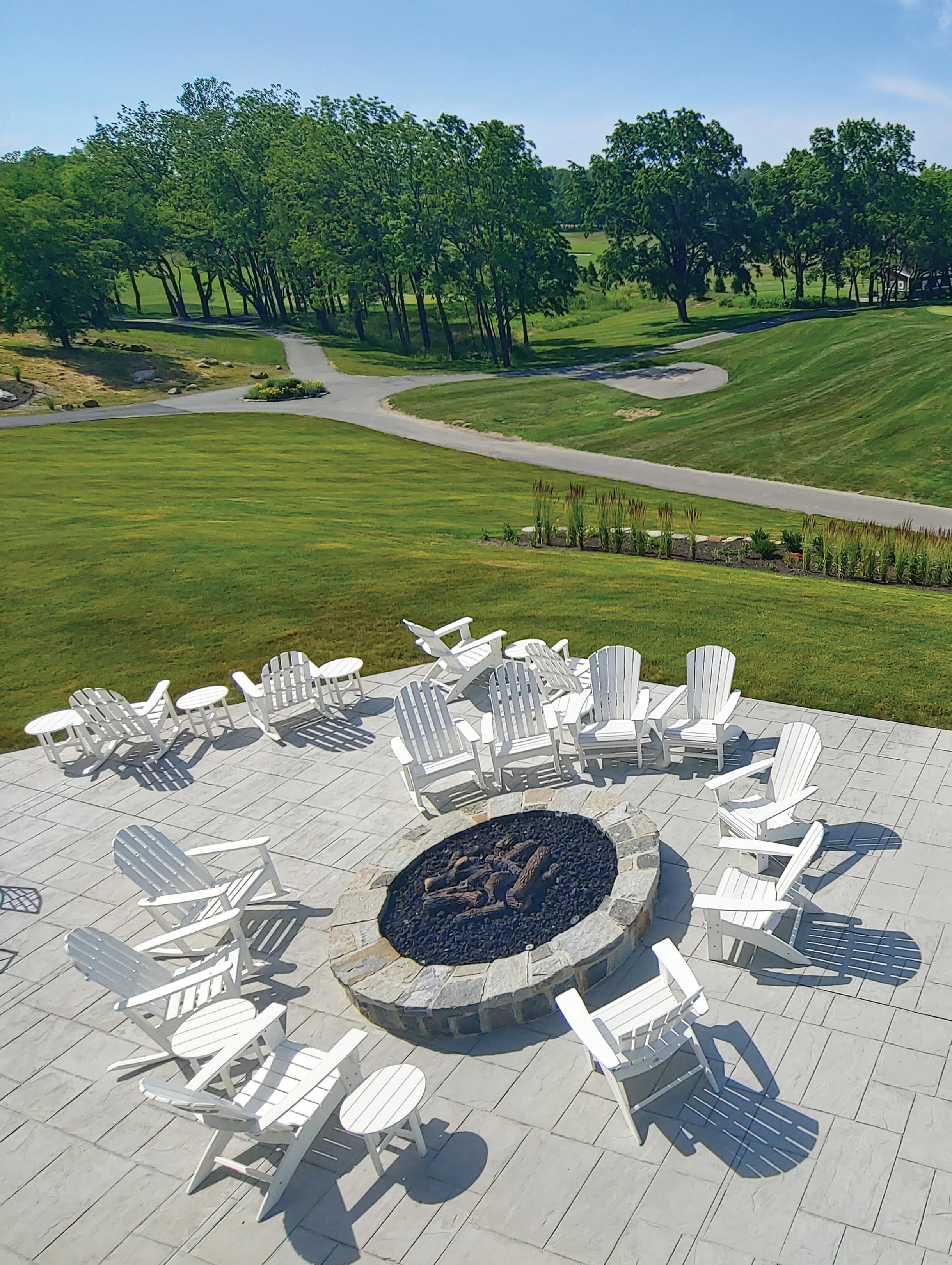 By Rob Thomas, Editor
By Rob Thomas, Editor
PEOPLE HAVE A WEALTH OF CHOICES when it comes to which club they choose to join. Clint Cushman, General Manager at The Club at Chatham Hills in Westfield, Ind., knows what separates his property from others.


“Definitely our amenities and service,” Cushman says. “Our amenities are a differentiator from other clubs, and we take pride in our service. This is a relational business, and our staff/member relationships are second to none.
Patrick Felts joined the team at Chatham Hills two years—starting as Food and Beverage Director and now serving as the ClubHouse Manager. He adds “experiences” to the reasons people are attracted to the club.
“We are not your traditional country club.,” Felts says. “We are a young, residential resort-style club with a hyper focus on hospitality and excitement. We create experiences you can’t have anywhere else because we have amenities no place else has.”
Felts points to the guest house, racquet facility, barn for events on site, bowling alley, indoor basketball courts, swim-up bars in the pool, an indoor year-round pool, and multiple dining outlets open year-round as prime examples.
About that barn … the club has an interesting connection to the Underground Railroad.


“Part of the amenities of Chatham Hills are the Lindley Home and Lindley Barn,” Cushman explains. “Thomas Jefferson Lindley was born here on October 7, 1843. His family were Quakers and strongly opposed to slavery, which led his father, Aaron Lindley, to become a leader in the anti-slavery movement.
“The Lindley family helped slaves
escape to freedom in Canada,” he continues. “Steve Henke, owner of Chatham Hills, restored the Barn and it has become a beautiful place for club events as well as a wedding/rehearsal dinner location.”
Attracting members hasn’t been an issue at the club, partly because living in
the neighborhood comes with a social membership. The neighborhood is still being built out, Felts says, and more amenities are planned.
“We have been very fortunate to have an unbelievable community which sells a ‘lifestyle’ to our members,” Cushman says. “We have done zero marketing for Chatham Hills and lot sales and membership have been incredible.

“I think our Mission Statement says it all … ‘We are focused on building a family-spirited, positive team that delivers world-class experiences to our members and guests daily,’” he continued. “We pride ourselves on creating memories for our members by providing world-class events, which in turn create unforgettable memories.”
Felts added that FOMO plays a large part in retention.
“Our retention is extremely high. We put on events and build memories for young families that are truly special and unique to us,” Felts says. “Our greatest asset is members’ personal social media

Attracting members hasn’t been an issue at the club. “We have been very fortunate to have an unbelievable community which sells a ‘lifestyle’ to our members,” says General Manager Clint Cushman.
to what you will find on our Championship Course.”
Snell says 19,000 rounds are played at the club annually, with the largest events being The Invitational (annual member/
guest with 144 players) and Chatham Cup (annual member/member with 160 players).

“We have also hosted state events from the 2020 Indiana PGA Section



pages as they show off their families and events that we do [creating] a fear of missing out to all of their friends, which leads to more members wanting to be involved with what we do.”
The Club at Chatham Hills features a pair of Pete Dye-designed golf courses— an 18-hole championship layout and a 9-hole executive course.
Brandon Snell, the club’s Head Golf Professional, says the courses are nestled among tree-adorned rolling hills and meandering creeks, and emerge unlike any terrain familiar to Central Indiana.
“The Championship Course provides golfers with a challenging, yet fun, course that can be enjoyed daily … offering a unique golfing experience due to the rolling terrain, playing through woods, down creeks and along ravines – something new to see on each hole,” Snell says. “Our executive course is a great test for your short game, featuring nine holes ranging from 50-100 yards. This course also features ponds and bunkers similar

Championship and the 2022 Indiana State Open,” he adds. “We are hosting NCAA D1 Women’s regionals in May of 2023.”
Chad Allen, Director of Agronomy at the club, manages a full-time staff of 12.In April, he will start to increase staff by hiring full-time/part-time seasonal employees. During the peak of the golfing season, he will have 22-24 total employees.
As a former substance abuse counselor at a nonprofit in the Indianapolis area, Allen’s background allows him to “meet people where they are and connect in a way that others might not” … assisting in
his ability to cultivate his staff.
“I believe autonomy is critical in attracting and maintaining a professional staff,” Allen says. “I asked our staff what they want to do. What kind of projects would they like to take on and what tools they need to accomplish those tasks? If we can fit it into our budget, we do it.
“I connect with everyone on a personal level and let them know that the most important piece of our agronomy puzzle is them,” he continues. “I can’t do what I do without them, and one of my most important responsibilities is to provide our staff with a safe, healthy, and fulfilling work environment.”
Fitness Manager Theresa Rendell heads the club’s full-service fitness experience. There are a variety of group fitness classes, including, cycle, barre, TRX, yoga, aqua fitness, Mat Pilates, stretch, dance fitness and cardio strength.
“There are indoor and outdoor pools with lap lanes, a cycle room, a designated group fitness room, a full weight gym with weight and cardio machines, a four-lane bowling alley and a basketball gymnasium,” Rendell explains. “Outside, there are multiple tennis and pickleball courts, as well as the outdoor pool and swim-up bar. We also offer personal training and various spa services.”

A kids camp, swim lessons, tennis lessons, pickleball lessons and swim team are additional options at the club.
Rendell and the club use social media to attract members with group fitness pictures, videos and highly skilled personal trainers and fitness instructors.

“We also market and advertise special fitness classes and activities on the member website and newsletter,” she says. “The fitness area speaks for itself when touring the facility. We have a friendly fitness attendant staff always ready to help members with any questions or concerns and keeping the fitness area fully stocked and tidy.”

It shouldn’t come as a surprise that basketball is popular in the Hoosier State. Somewhat fittingly, the club is home to a gymnasium with multiple hoops.
Whitley Johnson, the club’s Food & Beverage Director, oversees three dining options—Chat’s on the Hill for quick bite or grab-and-go, Hamilton’s Bar & Grill for sitdown dining, and The Hideaway by the pool during the busy summer season.



Perhaps the reason Rendell is so busy stems from the club’s plethora of dining options, including Chats on the Hill, Hamilton’s Bar & Grill and The Hideaway.
“If you’re at the turn and want to grab a hot dog or just stopping by for lunch, Chats is the go-to place,” says Food & Beverage Director Whitley Johnson.
“Hamilton’s Bar & Grill is our more formal sit-down dining option. Executive Chef Oscar [Perez] has an amazing menu.”





Johnson adds that the club recently launched its Chatham Cork Club, which boasts 60 crafted wine lockers in the dining room where members can buy and store wine for dinner service.


During the Summer season, The Hideaway is the club’s resort style full-service pool amenity.
“You can order from a server just like you would in the restaurant and your food is brought straight to you, whether you are poolside or sitting comfortably in one of our cabana areas,” Johnson says. “We also have a bowling alley and simulator lounge, [where] you can order food such as pizza and wings to enjoy.”

With myriad amenities, one might
think that The Club at Chatham Hills would be content to rest on its laurels, but that’s far from the case. Cushman is excited for the future.
“There are so many more exciting things on the horizon at Chatham Hills,” he says. “We are currently developing Chatham Village, which will contain several more amenities such as a 14-acre lake, which will have a marina, marina restaurant bar, water facility, fitness facility and a park, and shops for our members, as well the surrounding community, to enjoy.” C+RB


The thwack of a ball knocking down pins in one fell swoop is music to any bowler’s ears. At the Detroit (Mich.) Athletic Club, this sound can be heard over the din of members toasting their strikes in the newly refurbished space, where bowlers and non-bowlers alike are congregating. DAC Executive Manager and CEO Charles Johnson says the goal of the redesign was to combine the game with a social setting for players, spectators and guests. “From a liveliness standpoint, the reorientation of having everything together, whether you’re bowling or not … it feels alive every time you walk down there,” he shares.
A project that was years in the making, DAC’s Abbey redesign was the focus of many a discussion between the board and membership, but became a reality following the height of the pandemic. While the 108-year-old building had seen its fair share of minor updates, it hadn’t been significantly overhauled since the 1950s. Using input from two sub-committees, including bowling members and club leaders, a proposal to develop a more open floor plan that incorporated updated locker rooms, a pro shop and full-service kitchen, was put into action. Construction began in Febru-
ary 2022 and wrapped in time for a soft opening the following September and grand re-opening in October—just in time for bowling season.

While modernizing this part of the club was key to the redesign, DAC’s art and architecture committee took great pains to preserve as many of the historical elements as possible.
“Our curator and bowling department catalogued over 100 different items, like trophies and other items that we considered artifacts,” notes Johnson.
Woodwork behind the original bar was cleaned and re-stained, while the original
Tying together its bowling alley, social space and adjoining amenities maximizes the experience at this Motor City club.
Editor
Upon peeling back layers of old flooring during the renovation process, the club discovered mosaic tiling, which was a perfect fit to showcase the horseshoe-shaped bar. Executive Manager and CEO Charles Johnson describes the Abbey’s new look as “modernly classic and timeless.”
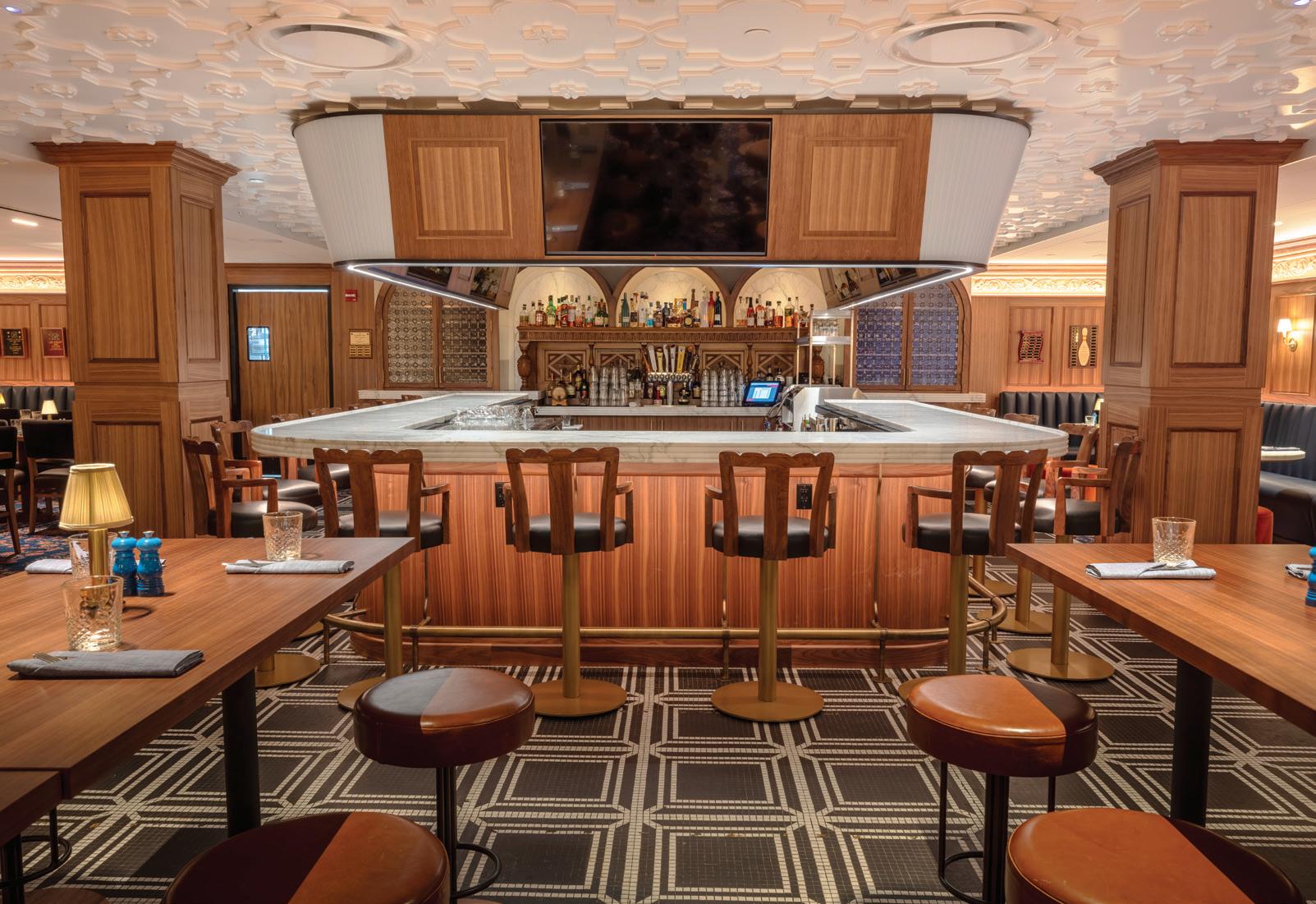
frieze was recast. Another notable addition was discovered upon peeling back layers of old flooring to reveal mosaic tiling, which was a perfect fit to showcase the horseshoeshaped bar.
With salvaged elements in mind, designers focused on marrying original pieces with contemporary, more purposeful ones.
“The intent was that if you didn’t know what the Abbey looked like before this renovation and walked down there today for the first time, you would think to some degree this is how it’s always been,” says Johnson who describes the new look as “modernly classic and timeless.”
A white ceiling balances out dark, patterned carpeting. A mishmash of seating
Detroit, Mich.
styles, including padded chairs and counterheight tables, offer plenty of options for dining and socializing between games.
Seating in the bowling area has also been refreshed with custom padded benches that enable players to interact more easily between lanes. An upgraded scoring system improves game play, which will be further enhanced by pinsetter improvements scheduled for a later date.

In addition to the bowling updates, the enlarged 10,352-sq.-ft. space is outfitted with a more accessible pro shop, enhanced locker rooms and a dedicated kitchen. Johnson admits that the former pro shop lacked visibility (“if you didn’t know to ask or didn’t know we had it, you missed out”) and
has been replaced by a more welcoming setup. The 2,217-sq.-ft. locker rooms now feature wood lockers and new stools, along with upgraded fixtures, carpeting, lighting and HVAC. Also commanding attention is a full-service kitchen, sporting a POS system for easy ordering—a vast improvement over the former commissary steam table and salad buffet.
During the Abbey’s extensive renovation, the designers were challenged by adhering to a proposed timeline. Supply and labor shortages threatened to overturn the original construction schedule and potentially disrupt member services, but with minimal setbacks, the new space was unveiled on budget and on time.
Hard work and dedication have proven invaluable, with DAC reporting positive member feedback and demonstrated interest. According to Johnson, the Abbey has seen three to four times more visitors since the renovation than it had in the past 10 years. He commends the refreshed digs not only for the bowling attraction, but for the added social component.
Project management: Capo Design Group, Bloomfield Hills, Mich.
Architect: ROSSETTI, Detroit, Mich.
Contractor: Frank Rewold and Sons, Rochester, Mich.
Carpeting: Axminster
Custom woodwork, including display cases, wall paneling, bowling booth seating and bar
“I’ve also heard from members that it’s a great place to have dinner as a single person … no one wants to sit in a restaurant by themselves, but the ambiance down there is very communal and social,” he says.
And with more members vying to join the club’s bowling program, DAC has surely bowled a perfect strike with the new Abbey.
“It’s just a place that people want to be and want to be part of,” adds Johnson. C+RB
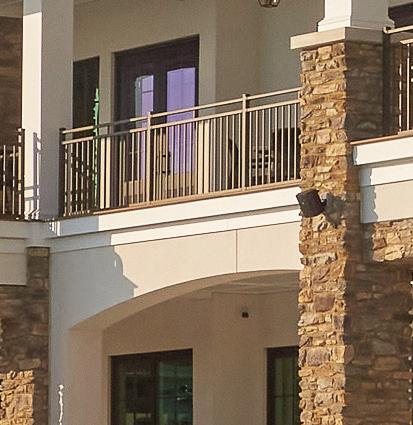










 By Pamela Brill, Contributing Editor
By Pamela Brill, Contributing Editor
COME ON IN, the water’s fine.

After an unseasonably mild spring and the promise of warmer weather ahead, clubs are getting a jumpstart on pool re-openings and refreshed surroundings that beautify these spaces. Sustaining the post-pandemic frenzy, this well-frequented amenity remains a popular spot where members of all ages and abilities come to congregate on a hot, sunny day.
As clubs look to appeal to younger members and families, the allure of water recreation, poolside dining and social outings is necessitating enhanced accommodations that bring members together and, in some cases, enable clubs to extend their season beyond Labor Day.

 Photo courtesy of Lancaster Country Club
Photo courtesy of Lancaster Country Club
Engaging and retaining new and younger members has been the focus at Lancaster (Pa.) Country Club, particularly over the last three years, during which the club unveiled the ‘LCC: A Defining Moment’ improvement plan. As part of this initiative, the property has been updated with a 24,000 sq.-ft. activities pavilion—including an 8,800 sq.-ft. aquatics and pool facility—that has become the go-to place for its membership.
General Manager/COO Ryan Granruth, CCM, CCE describes it as an “ample and better-suited location for our members [that enables LCC to take] full advantage of additional space on our property.” The pool opened in July 2021 and wrapped its first fully operational season last summer.

Built directly adjacent to the clubhouse, LCC’s pool complex is approximately one-third larger than the original footprint. The pool itself has been outfitted with enhancements aplenty, including a fountain and splash pad. The zero-entry design accommodates 14-inch water chaise lounges and an in-water bench. For landlubbers, a tiered viewing terrace overlooking the competition pool provides dryland accommodations.
Dining poolside is made possible via the Sunset Café, which replaces a small snack bar and limited menu. Now members can remain in their chairs for poolside food and beverage ser-

Lancaster, Pa.
“We have invested in brick-and-mortar infrastructure, but this year our season preparations are focused on investing in people, so we can provide members with not only an exceptional facility, but exceptional hospitality to go along with it.”
— Ryan Granruth, CCM, CCE; General Manager/COOvices. Orders are taken and delivered by club staff, equipped with iPads. The pool kitchen is a dedicated full-service facility that now offers lobster rolls, spicy tuna tartare, artisan pizza and steak and frites, along with signature cocktails, wine and beer. “We hope the features and comforts of our new pool complex provide members with an experience rivaling that of an exclusive resort,” says Granruth.
And if recent data is any indicator of member response, then this wish has been fulfilled. Since the project’s announcement, 90 new families have joined LCC, many of whom are spending time by the water. “Our guest count during the 2022 pool season surpassed the previous three years combined of guest visits to the old pool,” says Granruth. In addition, foodand-beverage revenues at the pool were up a whopping 300 percent from the previous pool café’s revenue.
In anticipation of another stellar season, LCC is preparing its staff accordingly with ongoing training. “A new pool is fantastic, but it takes a highly qualified and dedicated staff to bring it to life each and every day,” Granruth notes. “We have invested in brick-and-mortar infrastructure, but this year our season preparations are focused on investing in people, so we can provide members with not only an exceptional facility, but exceptional hospitality to go along with it.”

Greensboro,
Kids frolicking in the water don’t have to compete for space with swimmers logging their daily laps or families cooling off together, thanks to a new pool complex at Greensboro (N.C.) Country Club that was unveiled Memorial Day weekend in 2022. Part of a $20 million club-wide renovation—$4.1 million of which was budgeted for this portion of the project—the facility boasts three separate pools, enabling members of all ages to enjoy time on their own turf and feel like they are on vacation.
“A number of members [have] commented that GCC’s pool complex is a resort-style getaway, so they have decided not to travel as much and [instead] utilize the facilities at the club,” says COO/General Manager Friedrich Eder, CCM, CCE.
Amassing 14,224 sq. ft., GCC’s pool complex features a 5,153-sq.-ft. family pool (housed in the same space as the original structure), along with a new 2,574-sq.-ft. adult pool and a 741-sq.-ft. children’s splash pad. The family pool sports a zero-entry design, along with six lap lanes, a water basketball hoop, low- and mid-rise diving boards and a water slide. The heated adults-only pool has three lanes and in-water chaise lounges, while the splash pad is designed with interactive ground sprays and two spinning water fountains.

Another major asset of the pool redesign is an expanded pool deck, providing 50 percent more seating options for

members and their guests. Umbrella-covered chaise lounges, along with trellis-covered table seating, overlook both pools and the splash pad area, providing parents and caregivers with a comfortable, dryland vantage point. A variety of dining options are available just off the pool complex, including a sports bar, a pavilion bar (near the family pool), family grill restaurants, snack bar and GCC’s most popular spot, the Donald Ross Terrace, a partially covered bar and eatery adjacent to the adult pool.
A natural extension to the pool area is a fitness, health and wellness center, which hosts group exercise classes in and around the vicinity. New changing rooms, restrooms and showers were also added to this facility.
With so much attention given to boost family memberships at GCC, the pool complex has become tremendously popular. Last year, the adult pool was used well into November to accommodate aqua fitness classes and lap swimmers, prompting the club to open the facility before Memorial Day (the family pool and splash pad will adhere to their original Memorial Day opening schedule). As a result, the club can expect a full house yet again this year and will be ready. “We have a highly trained staff of lifeguards, pool attendants, a certified pool operator, director of aquatics and, of course, plenty of food-and-beverage staff providing service to our members and guests,” says Eder.
“A number of members [have] commented that GCC’s pool complex is a resort-style getaway, so they have decided not to travel as much and [instead] utilize the facilities at the club.”
— Friedrich Eder, CCM, CCE; COO/General Manager



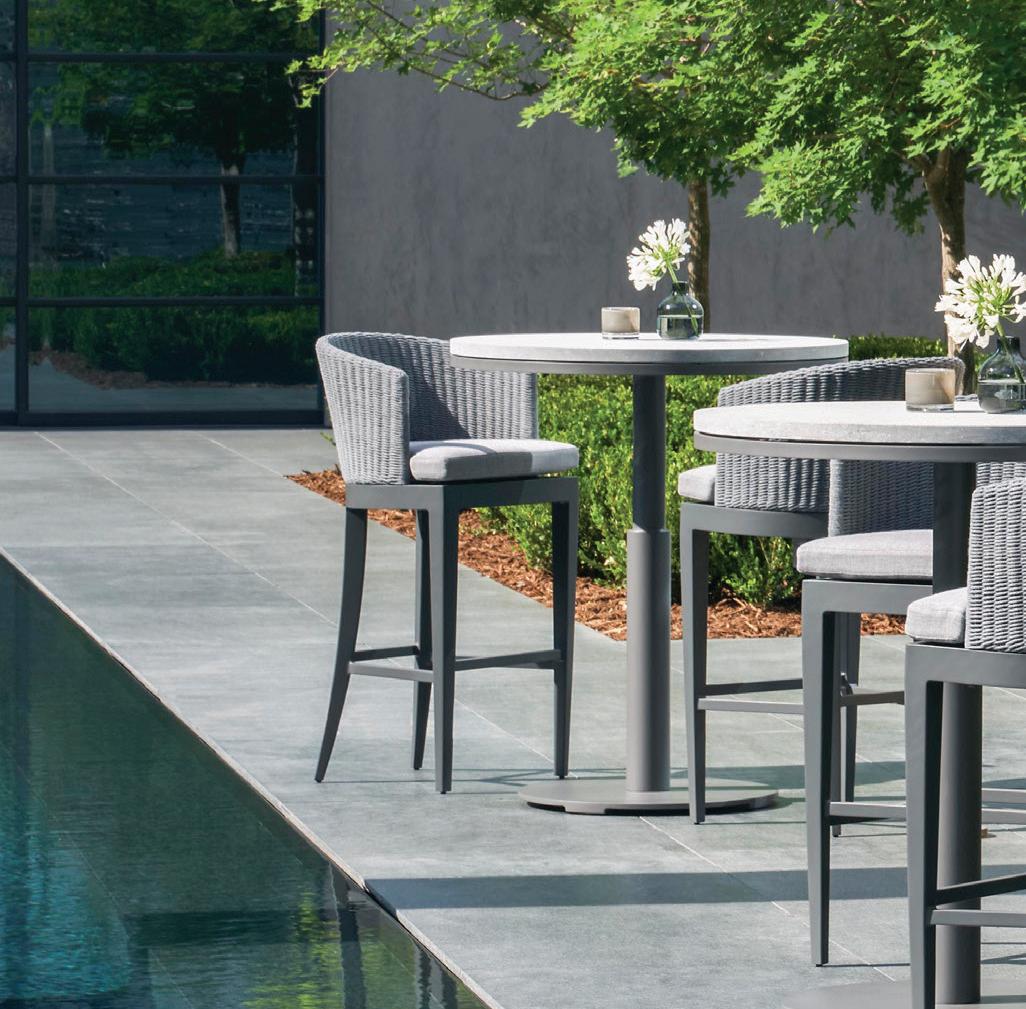







 Peninsula Bar Tables shown with Olympus Bar Chairs. Cushions by Perennials. perennialsandsutherland.com
Peninsula Bar Tables shown with Olympus Bar Chairs. Cushions by Perennials. perennialsandsutherland.com
At Westchester Hills Golf Club in White Plains, N.Y., members can enjoy a luxurious retreat without venturing far from home. It’s all thanks to a recent update to the club’s pool complex, which was completed in May 2021. “Our goal was to create a resort-style experience for our members,” says General Manager Josh Lowney, PGA, of the $750,000 improvement project that included new stonework, a new pool patio, bar area, furniture and lighting. “The key vision was a transformation of the space, so that members would decide to vacation with us and provide them with an extension of their backyard,” he adds.
Westchester Hills’ pool, which dates back to 1953, has been a perennial highlight of club life and continues to serve its membership well. Because the pool’s original footprint did not need to be enlarged, the emphasis was on expanding the surrounding area, showcased by 15,000 sq. ft. of patio space. “Families have celebrated, relaxed and enjoyed the space for generations, so it was important to us to protect the history while enhancing the atmosphere and experience for our members,” says Lowney.
Replacing a grass-covered area, the new patio fosters a resort-like setting for sunbathers and shade seekers alike.
White Plains, N.Y.
Seating is maximized with a major bump up from 75 to 300 guests, who can settle in any of the newly purchased chaise lounges, cabanas and day beds. Chaises are equipped with side tables and charging stations, enabling guests to stay connected while enjoying some down time. And when the sun sets and evening takes hold, accent and wall lights are activated, along with pillar lights positioned every eight feet, to add to the atmosphere. Lowney describes the vibe as “Miami Beach with a touch of Vegas; [it’s] certainly a key feature in our membership sales efforts and journey.”
As a result of this revitalization, members have been flocking to the pool in droves. In fact, according to Lowney, membership has reached peak numbers—the highest in club history— prompting the club to reinstate its initiation fees. In addition to seasonal usage, the pool has garnered interest for personal bookings outside of normal hours of operation. “We often have members looking to host parties and events of their own in the space because of the high-end summer feel,” he says.
And with the season opener right around the corner, Westchester Hills is abuzz with preparations which will kick into high gear in April. “When the pool is blue and the golf course is green, you know we are going to be set up for another successful season,” enthuses Lowney. C+RB
> Updated pool facilities offer universal appeal for members of all ages.

> Allotting space for poolside decking and outfitting it with new furnishings enables swimmers and non-swimmers to take advantage of the amenities.
> Expanded pool centers translate to increased F&B revenues and additional members.

“When the pool is blue and the golf course is green, you know we are going to be set up for another successful season.”
— Josh Lowney, PGA; General Manager

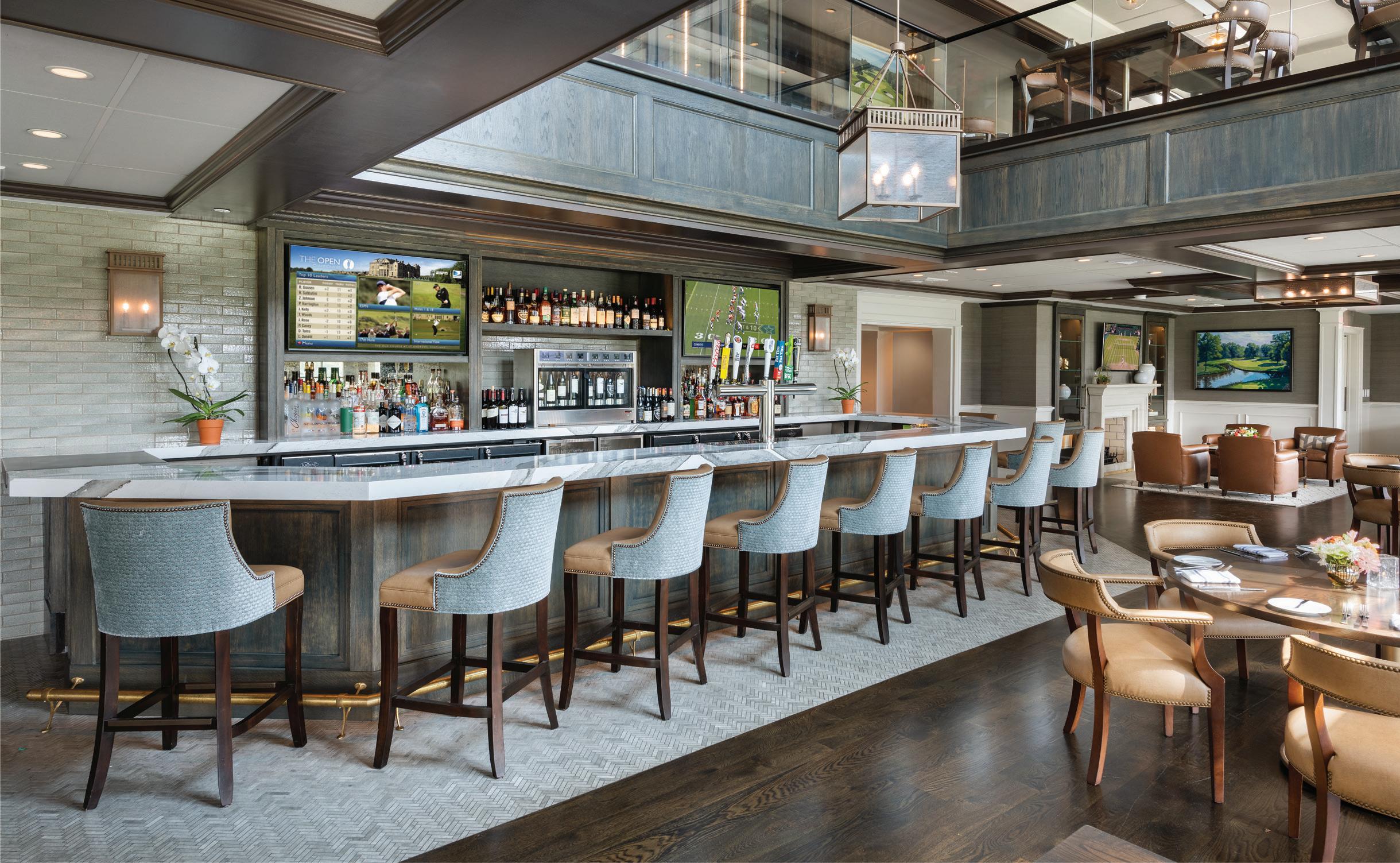


CLUBS THAT WANT TO BOOST their golf membership numbers may want to consider following in the footsteps of a Nebraska site.
Field Club of Omaha in Omaha, Neb. started offering complimentary golf lessons to golf members in 2020, and General Manager Greg Gilg says the program has provided “a real significant boon to our golf membership…Our membership loves [the program] and the usage continues to climb.”
Why was the initiative launched? While Field Club has a “very active” social membership, ”golf was always the one [membership
category] that lagged,” Gilg notes. A few years ago, club leaders discussed what steps they could take to increase the number of golf members.
“We always really hovered around 300 [golf members],” Gilg says. “... We felt like if we could get to capacity [of about 350], you’re still mowing the greens the same amount, your maintenance budget might tick up a little bit with more rounds played, but you still have the same number of carts…you have the same number of golf professionals.”
With a course that measures 5,200 yards and a pace of play expectation of 3 ½ hours for 18 holes, Gilg says he believed Field Club could attract some golfers at high-end public courses where it might take 5 ½ or 6 hours to play 18.

He notes club staff felt, “If we can…give one more reason as to why they should join with us…maybe [complimentary lessons] could be it.”
When the program was launched in 2020, Gilg says he was aware of only one other club in the country offering complimentary lessons. Starting the program meant investing more in personnel.
“We increased the base salaries for each professional who had been giving lessons in prior
The golf course at Field Club of Omaha in Omaha, Neb. is about 5,200 yards and players are expected to finish their 18-hole rounds in about 3 1/2 hours. Greg Gilg, the club’s General Manager, says he believed his facility could attract some golfers who regularly play at highend public courses.
seasons as a way to make up for the loss of income created by our strategic shift,” Gilg says. “...There was a slight increase in the golf shop staff budget above/beyond golf professional salaries as we added roughly 20 hours of golf shop staff per week to offset the number of hours our golf professionals spent giving lessons in lieu of working the golf shop counter.”
Giving lessons could be challenging at times. For one, Field Club does not have a full driving range; there is a teeing area where golfers can hit shots measuring 200 yards or less onto the 18th hole fairway. That spot can’t be used once golfers playing the course arrive at the 18th tee. To practice hitting woods, the instructors took members to the 7th hole tee box (a Par 5) and had them hit onto the fairway.
One-hour lessons were available with the Director of Instruction and Assistant Golf Professional Tuesday through Friday, and 15-minute lessons were offered on weekends, where instructors worked with members using hitting nets, the practice facility and launch monitors.
Club leaders also provided free lessons to draw more women and juniors to the game.
“We wanted to provide a resource… to just [say], ‘hey, get out there with your friends,” Gilg says. “Golf is so intimidating … it can be very frustrating. How can we help?’”
A look at the numbers shows the program has been successful. Before complimentary lessons were offered, Field Club had 272 golf members, but it now has 365, Gilg reports. Club instructors gave 473 complimentary and 29 paid lessons in 2020, 742 complimentary and 44 paid lessons in 2021, and 1,041 complimentary and 85 paid lessons in 2022.

The lessons are positively affecting members’ handicaps. Mem-
bers who took three or more lessons saw their handicap decline by six strokes (more than 30%) from 2021 to 2022. Members who had one or two lessons saw their handicap drop by 1.4 strokes (nearly 5%) from 2021 to 2022. The average handicap of members who did not take a lesson increased by 1.7 strokes last year.
Another key metric that is being watched is pace of play.
There has not been a noticeable improvement in pace of play, but Gilg believes that’s due to total rounds increasing because of COVID and the overall rise in the number of members. Even so, he states, “Our hunch is [the lessons] help, but we do not have any data that backs that hunch.”
Offering complimentary lessons has also had a word-of-mouth impact among members.
“As you have more golf members...playing, and playing better, and speaking positively about the program...[the number of] social members becoming interested in golf has gone up,” Gilg says.
To that end, there has been an increase in the number of lessons taken by both golf and social members at the club.
While the program has attracted many beginners, Gilg says it’s “still a hurdle” to get novice players to become repeat customers. The most common type of player using the free lessons, he adds, is the “bogey golfer” trying to lower their handicap to single digits.
This year, there will be a focus on clinics and small group lessons.
“Our get-golf-ready and intro to golf classes are getting a makeover,” says Gilg, who adds he will work with the new Director of Golf, Al Peterson III, to “see what tweaks he can bring...to take our programs to the next level.”

Club + Resort Business is recognizing the TOP RANKED CLUB & RESORT facilities, programs and initiatives for all aspects of club operations.


MARCH: CULINARY
APRIL: FITNESS & WELLNESS CENTERS
MAY: AQUATICS / POOLS
JUNE: RACQUET FACILITIES
AUGUST: PATIOS
NOVEMBER: PRO SHOPS
DECEMBER: CLUBHOUSES
• Max 3 sponsors per category
• Full page ad in C+RB Magazine
• Digital recognition on C+RB website (300x250 or 728x90 ads)
• Recognition in newsletters (300x250 ad)
• Social Media recognition as category sponsor
• You can nominate 5 of your customers’ club projects for Top Ranked Club + Resort recognition
• Sponsorship rate: $5,000
2023
























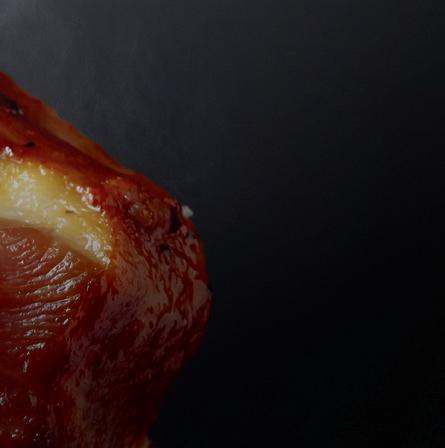


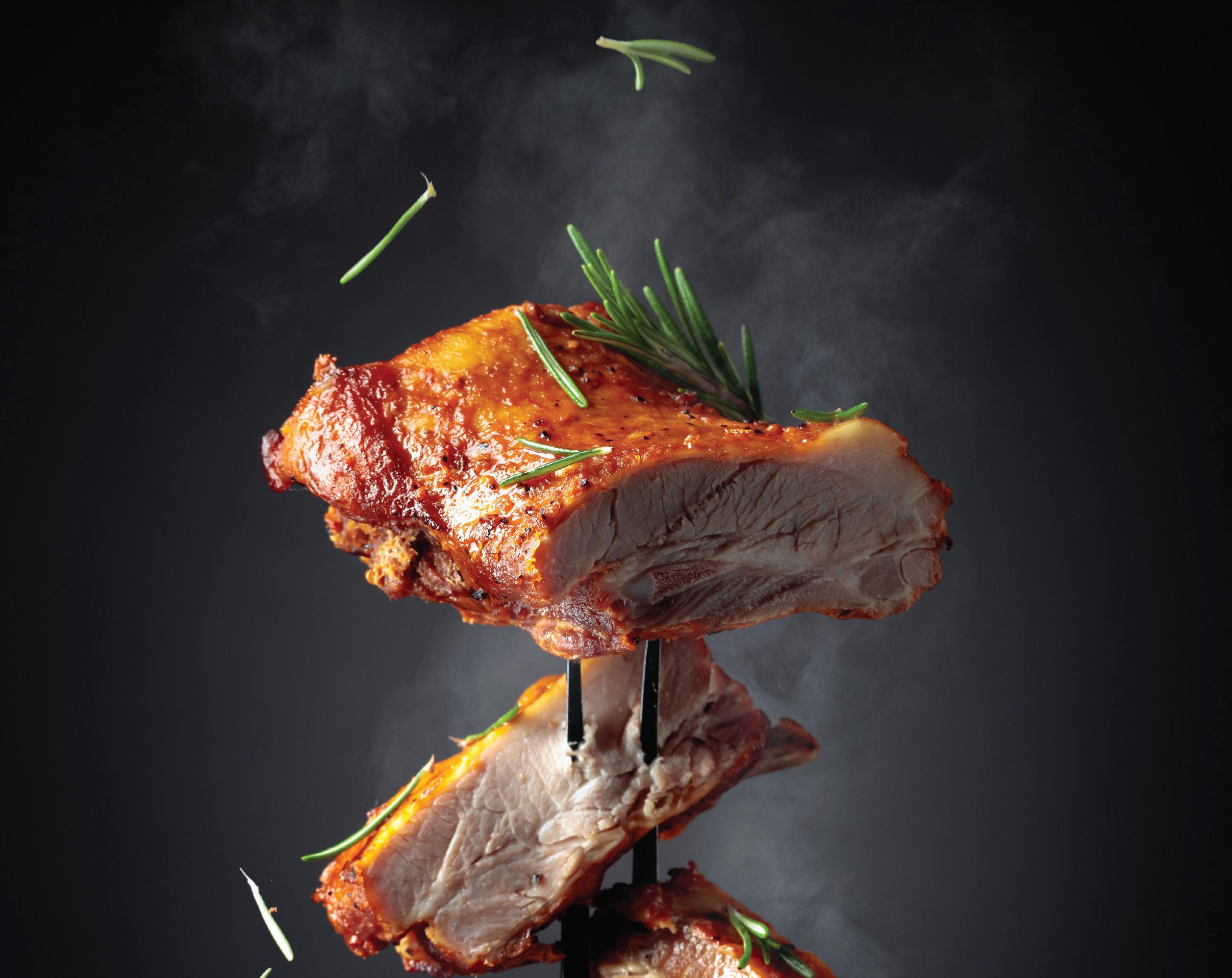
MY HUSBAND AND I WERE IN NAPA in January with my sister and brother-in-law. Our original plan was to go to Peru, but civil unrest and travel bans landed us in wine country. My only request for the trip was to dine at restaurants I’d never been to. I didn’t care how many Michelin stars they had or didn’t have; I just wanted to try delicious food.
One of our dinner reservations landed us in a yurt village set up in the courtyard of a restaurant run by a prominent and highly decorated chef. I had high hopes for this meal, and it did not disappoint—not because the food wowed me, but because it took so many unexpected twists and turns.
For example, one of the courses was an oyster. My sister has a seafood allergy, so oysters were not part of her experience. The oysters were delicious, but her substitution was a date—just one, small, oblong, slightly wrinkled date, placed in a little bowl and served in step with the oysters. The date was not wrapped, stuffed or modified. It looked so sad, lonely and pathetic in that bowl.
When the server placed it in front of her, she burst out laughing. This made us all laugh. That may have been the point.
The next day, we had time to kill between tastings, so we stumbled into a roadside market with a taqueria near the back that one of the sommeliers we met suggested. The menu was
simple, the food was made to order and the smells from the kitchen were intoxicating. I had a chorizo taco with an amalgamation of toppings that was so satisfying and delicious that I’m sad I don’t live close enough to go back for lunch regularly.
These two end-of-the-spectrum meals amuse me for a lot of reasons. But the culinary narrative of my trip feels in line with club chefs’ daily challenges. Serve a wine dinner, but don’t include seafood for one guest. Serve the best tacos your members have ever had. Make sure to have plentiful wine—though some of your members might be ‘wined out’, so better have a great bourbon list, too.
I guess the lesson is this: When you’ve had enough, and you need a laugh, be bold enough to drop a date into a fancy bowl and pretend it’s the equivalent of an oyster.
 EDITOR Joanna DeChellis jdechellis@wtwhmedia.com 412-260-9233
EDITOR Joanna DeChellis jdechellis@wtwhmedia.com 412-260-9233









CLUB + RESORT CHEF’S MARCH issue features the 2023 Top Ranked Culinary Experience list, with Palm Coast, Fla.-based Hammock Dunes Club in the top spot (p. 38). The club’s culinary o er has grown steadily over the past few years, thanks to a sharp uptick in membership since 2020.
But what’s most impressive about this culinary team is their commitment to learning and growth, always striving to improve their skills and present members with an unparalleled culinary experience.
Top Ranked entries, as always, were judged independently by a panel of club and resort chefs based on points assigned to menus, frontand back-of-house photos and more.
Dozens of clubs and resorts submitted to Top Ranked for the first time this year, each with information or initiatives that others in the industry can learn from. So, new in 2023, C+RC’s editors called out several clubs and their culinary teams throughout the list that impressed us for one reason or another, independent of the judges’ scores.
Knoxville, Tenn.-based Cherokee Country Club just completed a $7M dining renovation. Edmond, Okla.-based Rose Creek Golf Club is home to a Parisian-inspired speakeasy. The Club at Ibis (West Palm Beach, Fla.) applied
for a new visa that enabled it to hire Italian sta for a truly authentic Italian restaurant. The Philadelphia Country Club is implementing four-day work weeks. Sycamore Hills Golf Club in Fort Wayne, Ind., installed an allergy cooking station, inspired by Farmington Country Club (Charlottesville, Va.), 2022’s Top Ranked Culinary Experience. See pages 40-45 for more from these clubs and others.
We will continue to reach out to clubs on the Top Ranked list to learn more about their foodand-beverage programs and share their stories and successes with you.
And, of course, we are always looking for ways to refine and improve our programs, including Top Ranked, to better serve this industry’s chefs and culinary teams. If you have ideas or suggestions for 2024, please let us know.
Congratulations again to Hammock Dunes’ Ranked clubs.
SENIOR EDITOR Isabelle Gustafson igustafson@wtwhmedia.com 216-296-2041
Isabelle Gustafson igustafson@wtwhmedia.com 216-296-2041

Hammock Dunes Club’s culinary program named C+RC’s 2023 Top Ranked Culinary Experience










C+RC is reconizing several standout clubs and their culinary teams on this year’s Top Ranked Culinary list for their e orts and intiatives throughout 2022.

Despite a challenging start to his rst Executive Chef role, Nick Marchesano is poised to further enhance The Gasparilla Inn & Club’s culinary program while recruiting and training the next generation of cooks.
Club chefs must satisfy members’ love for seafood staples while navigating uctuating supply chains and costs, and providing diverse options from the vast array of available seafood.

Dessert boards have earned a spot at the table, giving members a chance to sample a variety of tastes in one sitting.
Whether teeing up for a good cause or a tournament, club members count on chefs who can pull o a crowd-pleasing meal.
Robert Meitzer, CEC, AAC, Executive Chef of Forest Lake Club in Columbia, S.C., says Australian lamb is a favorite for members of all ages.

New York natives Nick Markel, GM/COO, and Joe Piazza, Executive Chef, are evolving the Country Club of Bu alo’s culinary program, thanks to a newly renovated kitchen, restaurant pop-ups and more.
As clubs evaluate what they o er in employee bene ts packages, parental leave can serve as a way to drive recruitment and retention while improving productivity.
C+RC Editorial Report
THE CULINARY OFFER AT HAMMOCK DUNES CLUB in Palm Coast, Fla., has experienced consistent growth thanks to a sharp uptick in membership since 2020. With growth comes food-and-beverage revenue, which now rests north of $3 million, up nearly $1 million in just a few years.
The culinary team creates innovative, outside-the-box concepts for the club’s nearly 750 members across fine dining, casual and family-friendly food-and-beverage outlets while remaining steadfast in service and quality.
“The membership, culinary team and oceanside location are what make this club so special,” says Executive Chef Lance Cook, WCMC, WMCS, CEC, CCA, CFBE, FMP, CFSM. “Every effort is put toward enhancing the dining experience and service that are hallmarks of Hammock Dunes.”
Hammock Dunes specializes in continental cuisine, prepared using French techniques. The team is constantly sourcing new ingredients and learning new preparation methods to improve their skills and maintain their standing as club culinary leaders.

Chef’s tables have skyrocketed in popularity, promoted solely through word of mouth and fully booked through
the season. Hammock Dunes hosts up to four weekly chef’s tables with seven courses. While these are a major draw for members, they’re also an important opportunity for the culinary team to work side-by-side with Cook.
Hammock Dunes sources specialty products for chef’s tables to expand members’ palates and to enable the culinary team to work with ingredients they might not have used before, says Cook, who takes the opportunity to educate the team on each ingredient, their various uses and ways of preparation. “For example, we got some head-on shrimp the other day and made a surf-and-turf with foie gras and cherry chutney.”
Hammock Dunes’ culinary team is deeply passionate about their skill development, Cook notes. This is further fostered by the club’s culture of learning and mentorship, with initiatives like a corporate membership with the American Culinary Federation (ACF) “for anyone on the culinary team interested in certification, competitions and other benefits.”
“They see my involvement in these organizations and want to be part of it,” notes Cook, who aims to lead by example.
This past year in particular, the team’s
overall skill level has increased in spades, partly due to the club’s newly refined method for attracting talent.
In building a Top Ranked team, Cook’s found success with tools like ApplicantPro, which extends a job posting’s reach across dozens of sites, as well as a new employee referral program, which offers bonuses to both referring and new employees based
on longevity: $150 each after 45 days; $200 each after 90 days, plus a $150 gift card to the referring employee; $350 each after six months, plus eight hours paid wages for the referring employee; and $500 to the referring employee at the one-year mark.
The club has also raised wages and increased benefits, including reimbursements for bridge tolls, gym membership deals and certifications, all of which are paid for by a monthly service fee for members ($50 for single members and $75 for couples). Non-members pay a service charge at the time of the event for banquets.
Reflecting on this past year and Hammock Dunes’ Top Ranked Culinary award, Cook says he’s most grateful for the recognition of his team’s efforts.

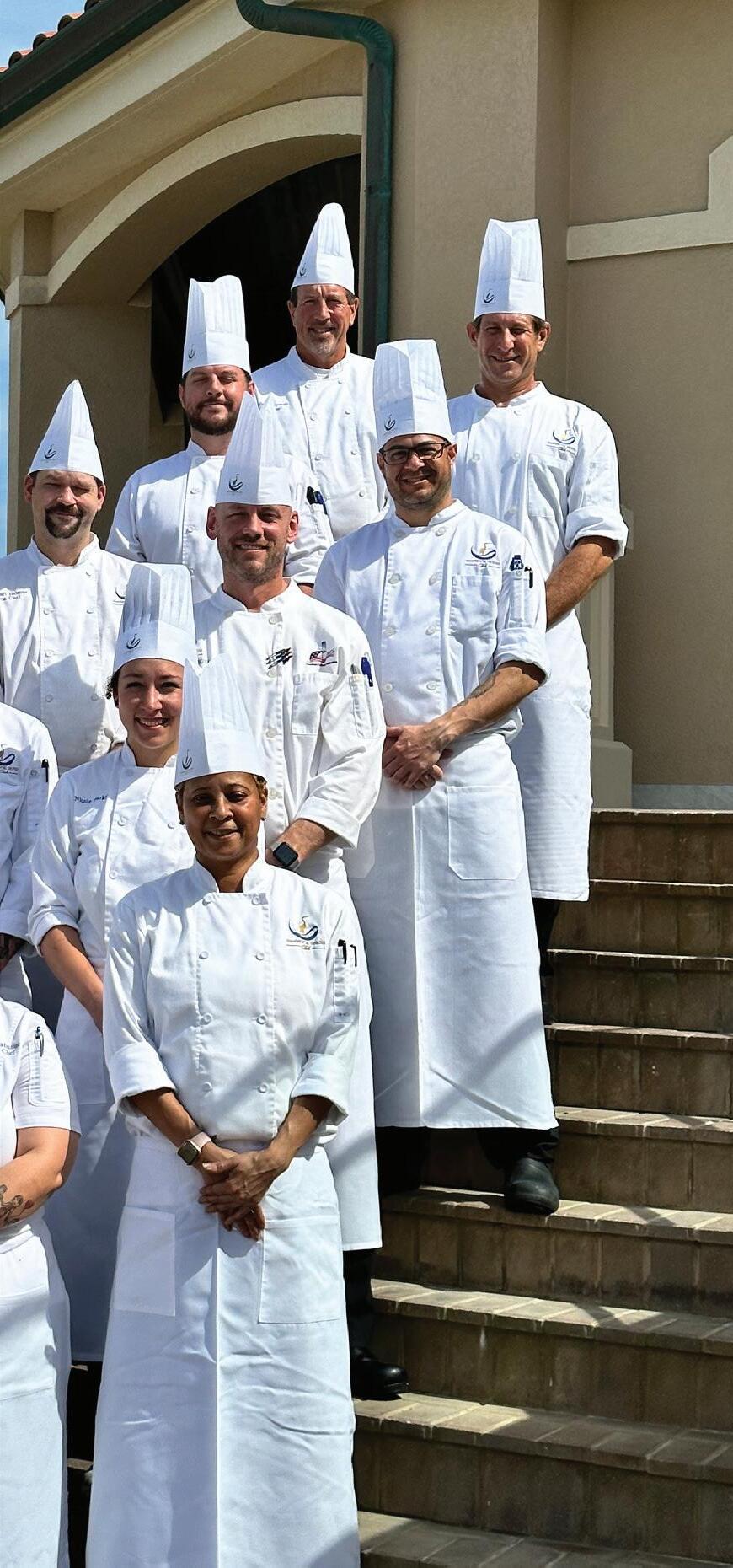
Membership size: 740
Annual F&B revenues: $3M



A la carte F&B outlets: 6
Average weekly a la carte covers: 1,650



A la carte kitchens: 4
Banquet kitchens: 1
Total banquet capacity: 300
Back-of-house employees: 26






Front-of-house employees: 44
Food cost percentage: 48

Cook says this industry—and all those who contribute to club culinary success—deserve applause. “I look at these clubs and resorts and think, ‘Wow, it’s an honor to be on that list.’” C+RC
Palm Coast, Fla.-based Hammock Dunes Club was rated 2023 Top Ranked Culinary Experience by a panel of chef judges, based on points related to menus, back- and front-ofhouse photos and more.
With nearly 3,400 members and $21 million in annual food-and-beverage revenue, The Landings Golf & Athletic Club in Savannah, Ga, boasts one of the largest culinary brigades in the country, spanning ten standing culinary concepts, from fastcasual dining to 10-course tasting menus, and hundreds of events a year, led by Executive Chef Sam Brod, CEC.
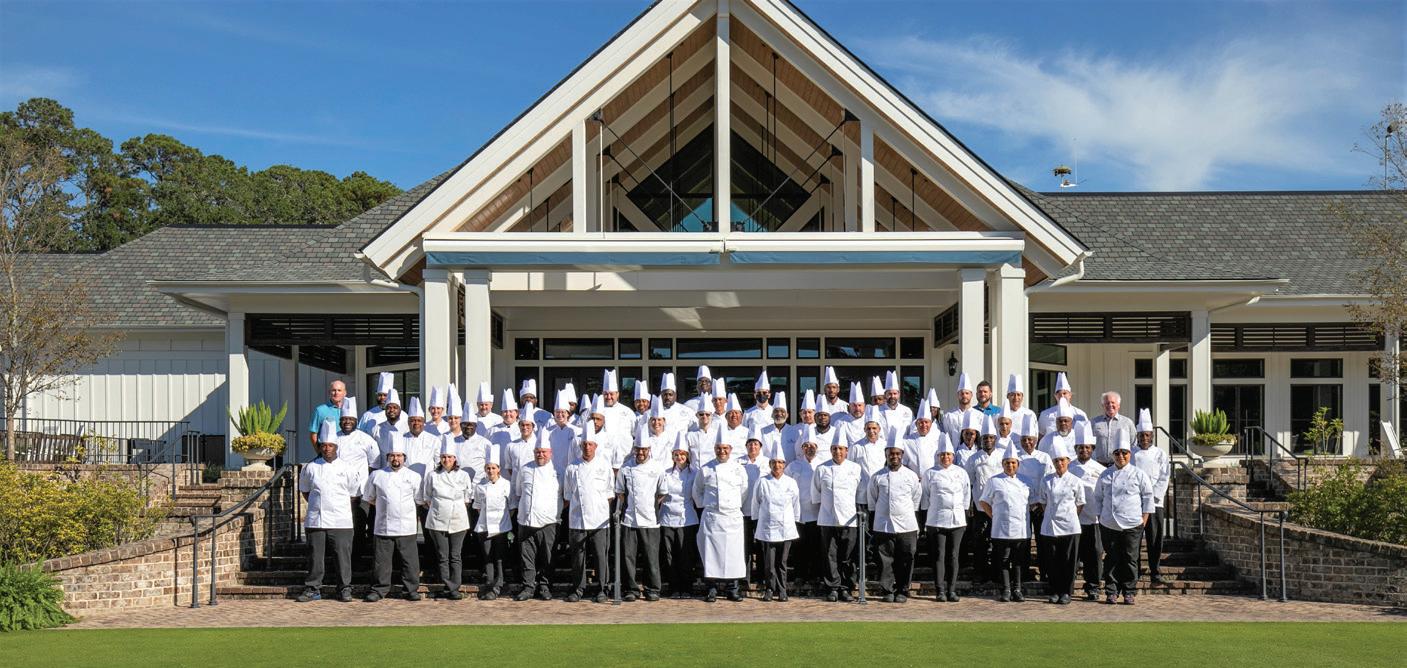
Among its efforts to find and retain talent, the club hired a central foodand-beverage recruiting manager, and it offers multiple training programs for staff, including a 3,000-hour American Culinary Federation (ACF) apprenticeship.
The Landings has also initiated an incentive program to show appreciation for team members who pick up extra shifts when needed.
Team members earn points for each shift they pick up, which can be redeemed for rewards at three levels, including gift cards, trolley tours, Landings merch, VIP stadium tickets and more.
The club also offers an 18-week internship program for soldiers stationed at Fort Stewart Hunter Army Airfield as part of their active-duty training. C+RC
Knoxville, Tenn.
Cherokee Country Club is known throughout Knoxville, Tenn., for its exceptional culinary experience.

“In last year’s member survey, dining was the most important activity at the club, with a 98% rating,” says Executive Chef David Pinckney.
In 2022, the club completed a $7 million dining renovation, adding family and formal dining areas, a buffet room, a larger pub and a 100-seat, two-tier terrace overlooking the Tennessee River and Great Smokey Mountains.
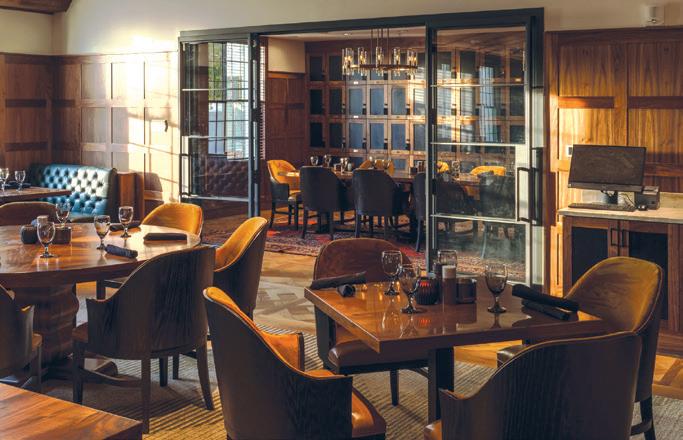
“I don’t think anyone objected to the club’s yearly food minimum of $800,” says Pinckney. “It has been eliminated for the upcoming year.”
Cherokee culinary staff ’s skill level also sets the club apart. The team comprises at least five former executive chefs from other clubs and restaurants alongside 10-plus-year employees that lead the line.

“We have doubled our food-andbeverage program since I started 16 years ago,” says Pinckney. “We’ve also added 300-plus member families.”
Fort Wayne, Ind.
With 498 members and $2.7 million in annual food-and-beverage revenues, Sycamore Hills Golf Club in Fort Wayne, Ind., aims to bring fresh and modern culinary concepts and experiences to its members throughout the year.

“Our culinarians embrace the scratch lifestyle and never take shortcuts regarding the quality of our offerings,” says Executive Chef Anthony Capua, noting that the team takes extra effort to buy ingredients locally through farmers’ markets and other companies and even sources its own greens via an on-site herb garden.
“We love to push new creative ideas,” he says, “such as our Battle of the Club Chefs event and our collaborative wine dinner series, where we invite some of the top club chefs from around the country to come to cook with our team in a wine dinner format.”
Capua says he loves that this allows his team to experience working with different chefs and their cooking techniques, adding to their culinary repertoire.
“We also aren’t afraid to look at what others are doing and adapt ideas to our kitchens,” says Capua. “A great example is our new allergy cooking station in our kitchen. This was an idea we borrowed from Farmington Country Club (Charlottesville, Va.) after reading their 2022 Top Ranked Culinary Experience profile.” C+RC
With a membership of almost 4,500 and $6 million in annual food-and-beverage revenues, Bonita Bay Club (Bonita Springs, Fla.) operates nine unique a la carte and three banquet outlets offering a diverse array of menu options, with Executive Chef Richard Brumm, CEC, WCEC, CCA, AAC, at the helm.

“The team takes great pride in finding a balance between culinary fundamentals and innovative, creative cuisine through an ingredient-focused experience,” says Brumm. Throughout its venues, Bonita Bay’s culinary team executes 18 seasonal menus—12 daily and five weekly—plus featured menu items, showcasing local produce and proteins in a true from-scratch setting, including (but not limited to):
• Finfish are brought in whole and broken down by a dedicated fishmonger. Trim goes to fish tacos, terrines and charcuterie, and bones go to stocks, soups and sauces.
• Lacto-fermentation is used to reduce vegetable waste and create depth in dishes.
• Items made in-house include pasta, soups, stocks, dressings, sauces, pickles, ice cream, brisket, pastrami and more.
• All spices are milled in-house, including cinnamon, cumin, coriander, cardamom and more.
• Bonita Bay culinary staff maintains a root cellar to properly store items like tomatoes, potatoes and carrots.
• The team produces 100% of all juices (citrus and otherwise) for all culinary and bar areas and bottled juices for the beverage carts, including orange, lemon, lime, apple, cranberry, green goddess and many others.
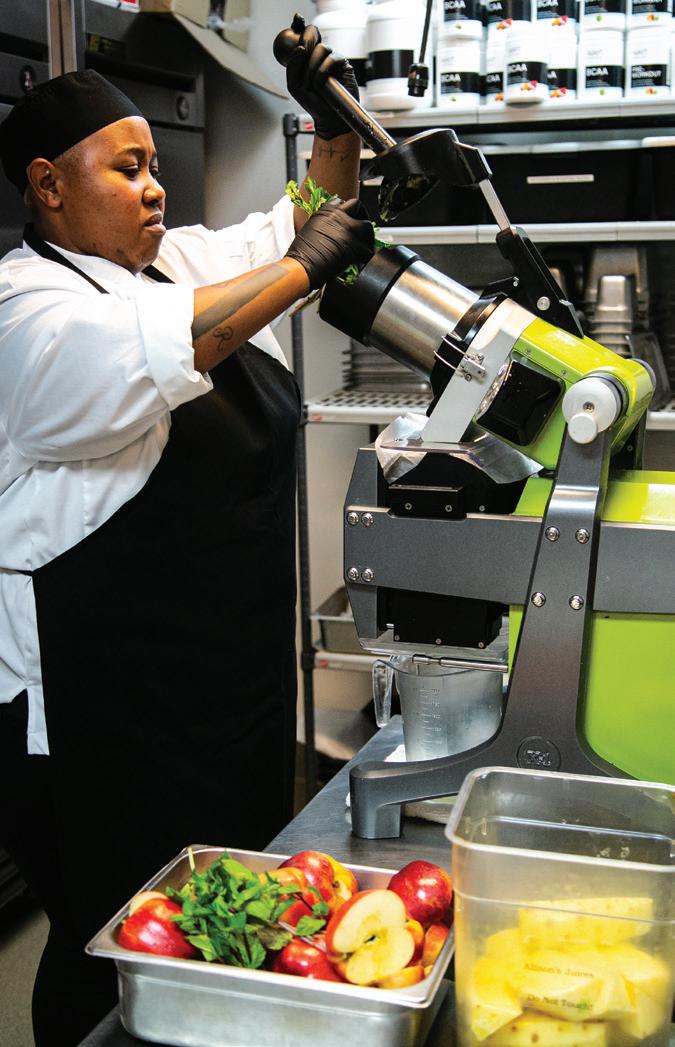
• The club’s apiary produces its honey. Also notable, the club maintains a staff that is 50% larger than necessary in offseason months, which ensures its core group is taken care of, says Brumm, and allows for training, education and personal growth opportunities.
“We have consistently been able to maintain five-day work weeks for salary and

line staff, and salaried management works a three-day week six months of the year,” he adds. “Our program is designed to give hours to those who desire them.”
Finally, Bonita Bay is beginning a rebuild of its second clubhouse in April, which will feature a brand-new back-ofhouse operation. This will be the fifth kitchen the club has built or renovated in eight years. C+RC

Renovate and reimagine your club’s food and beverage future

Whether you’re breathing new life into existing dining amenities or building a new F&B outlet, we focus on opportunities that create consistent operational excellence and extraordinary member and guest hospitality experiences.
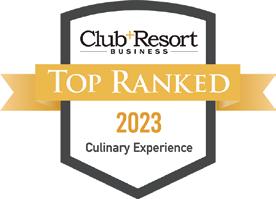


Set a new path with RealFood Hospitality, Strategy and Design:
Foodservice facility design for commercial kitchens, bars and service areas

F&B feasibility studies masterplanning, business and financial planning

Concept and brand development for new and existing dining outlets
F&B operations improvement opportunity assessments and systems development
F&B menu engineering strategic advisory and development
Tap into our expertise. Start with RealFood.
rfhsd.com
617.876.2100
connect@rfhsd.com
Photos: Scott Sikora Photography, The Club at ArrowCreek, Reno, NVROSE CREEK GOLF CLUB
Edmond, Okla.
Rose Creek Golf Club has crafted two distinct dining experiences for its 730plus members, led by Executive Chef Jim Camp—a farm-to-table restaurant and a Parisian-inspired speakeasy.
Neighborhood Provisions focuses on rustic, farm-to-table dishes. The menu changes every eight weeks and “elevates humble ingredients and a local ethos of
seasonality.” Everything is made from scratch, including sauces, dressings and pizza dough.
Meanwhile, Caché transports members to 1920s Paris with 42-plus liquor selections (one of the largest in the city), nightly live jazz and a traditional French small bites menu featuring items like escargots de Bourgogne, Moules Provençale, pâté de campagne and fromage et terrine du jour, plus various types of caviar.
Members can start their evening in Caché, then meander to Neighborhood Provisions for dinner. C+RC
West Palm Beach, Fla.
The Club at Ibis provides its 3,400plus members with a vast culinary experience, led by Executive Chef Jerome Nicolas—from fine dining in Panache to casual lunches and dinners in The Atrium and The Pub, to Ibis’ newest venue, Amici Ristorante, made possible by the Q-1 visa.
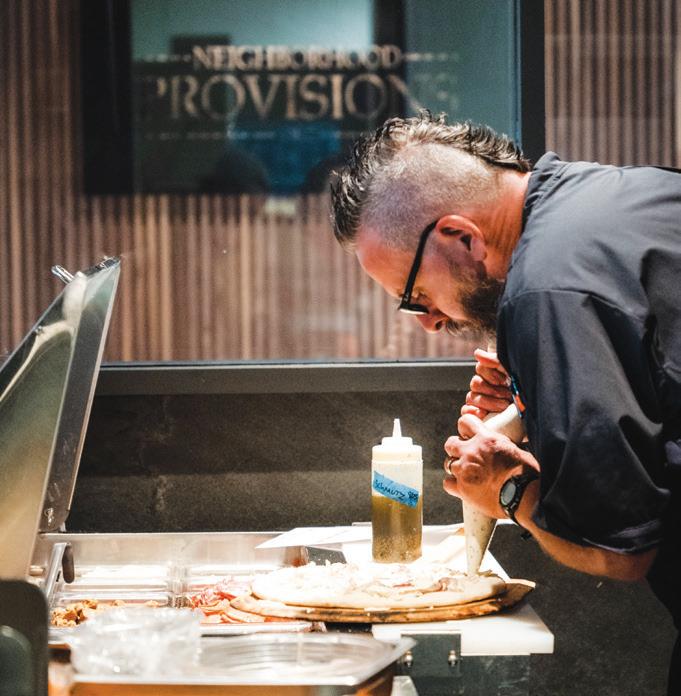

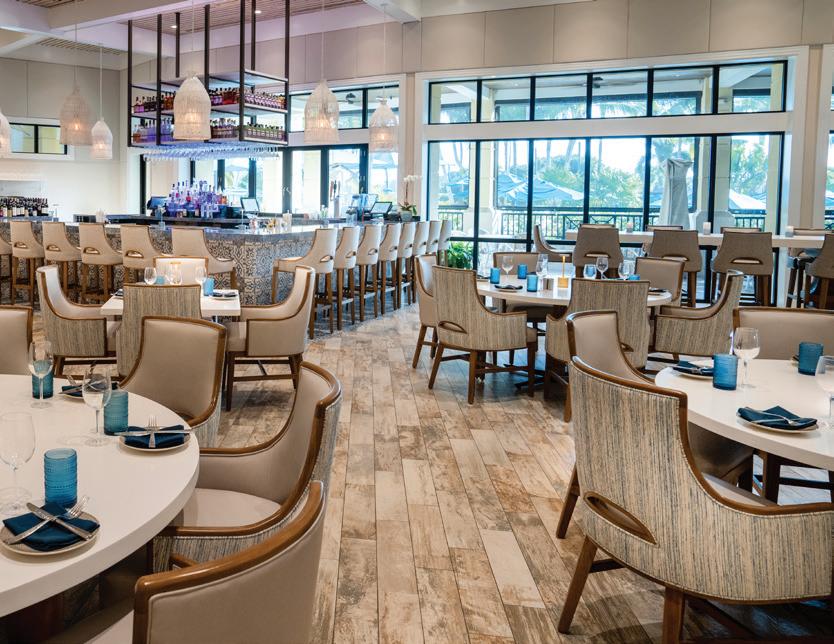
The Q-1 visa, which the club applied for this past year, is a cultural exchange program designed to share the home country’s history, culture and traditions. Acceptance of the visa application prompted the club to renovate its Bistro Restaurant, rebranding it Amici Ristorante, an authentic Italian restaurant staffed with mostly Italian chefs and team.
Amici’s menu was inspired by Central Italy, Rome, Perugia, Tuscany and Chef Francesco Latarullo’s hometown of Umbria. Latarullo’s cooking style is contemporary but loyal to tradition.
In addition to Italian cuisine, the club offers Italian language, cooking, wine-tasting and more.
The feedback from members has been “outstanding,” and it provides the club with year-round staff in addition to the seasonal team.
Philadelphia, Pa.
As “the oldest country club in the United States,” with 1,800 members and $7 million in annual food-and-beverage revenue, the team at The Philadelphia Cricket Club (PCC) feels responsible for honoring its heritage. Still, at PCC, ‘traditional’ doesn’t equate to stuffy or stale, notes Executive Chef Benjamin Burger.

To keep pace with labor challenges, PCC has expanded its HR team to include a dedicated recruiting specialist who works closely with the culinary team.
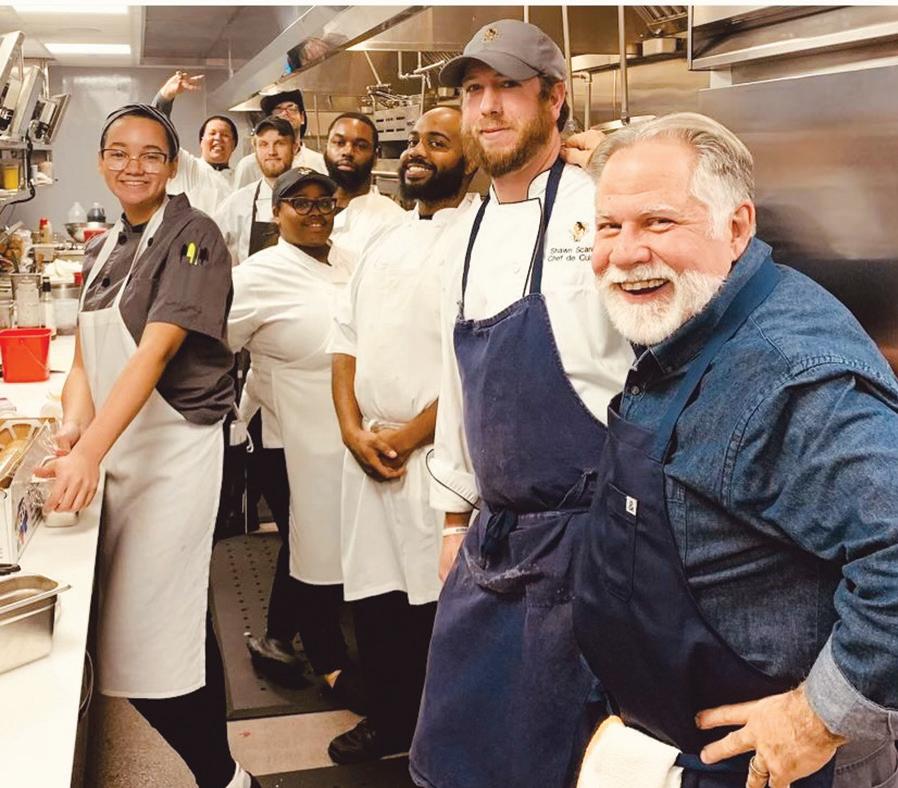
“Of course, we believe a positive work culture and efficiency in hiring should be the bare minimum,” says Burger. “We’re always looking to raise the bar, not skate by it. It would be unfortunate if we were at risk of missing out on talent because they could make a more livable wage elsewhere. Thankfully, our members understand and support our needs, and they were eager to fund an increase in payroll that kicked in a year ago. No one here earns less than $15 per hour, and 98% of our culinary staff, including stewards, currently earn above this threshold and are trending upwards.”
PCC also rewards culinary staff for their hard work with food-and-beverage
bonuses. Members are billed a service charge for all food they purchase at the club, and 4% of this goes into a pool split quarterly among all staff who have worked at least 250 hours for that bonus period. This pool is shared between both front- and back-of-house employees.
“This supports our collaborative team atmosphere while allowing our focus to be less on personal finances and more on the business of making members happy,” says Burger. “As our club leadership always says, ‘Happy employees take the best care of our members.’”
The club has taken a fresh look at how it supports work-life balance for its employees via sustainable staffing schedules.
“In many cases, we’ve been able to implement four-day work weeks for both hourly staff and managers,” says Burger, with the current goal of staff working four

days a week with the ability for everyone to get at least one weekend day off.
“You’ll never hear, ‘It’s how it’s always been’ as an excuse at PCC,” says Burger. “We insist on being a place where employees are shown they are valued, not only with words but with actions, such as increased compensation and qualityof-life initiatives. It’s who we are and the most important element of our success in attracting and retaining staff.” C+RC
WHEN NICK MARCHESANO ACCEPTED the role of Executive Chef of The Gasparilla Inn & Club (Boca Grande, Fla.), he had no way of knowing Hurricane Ian would slam into the island two months into his tenure.

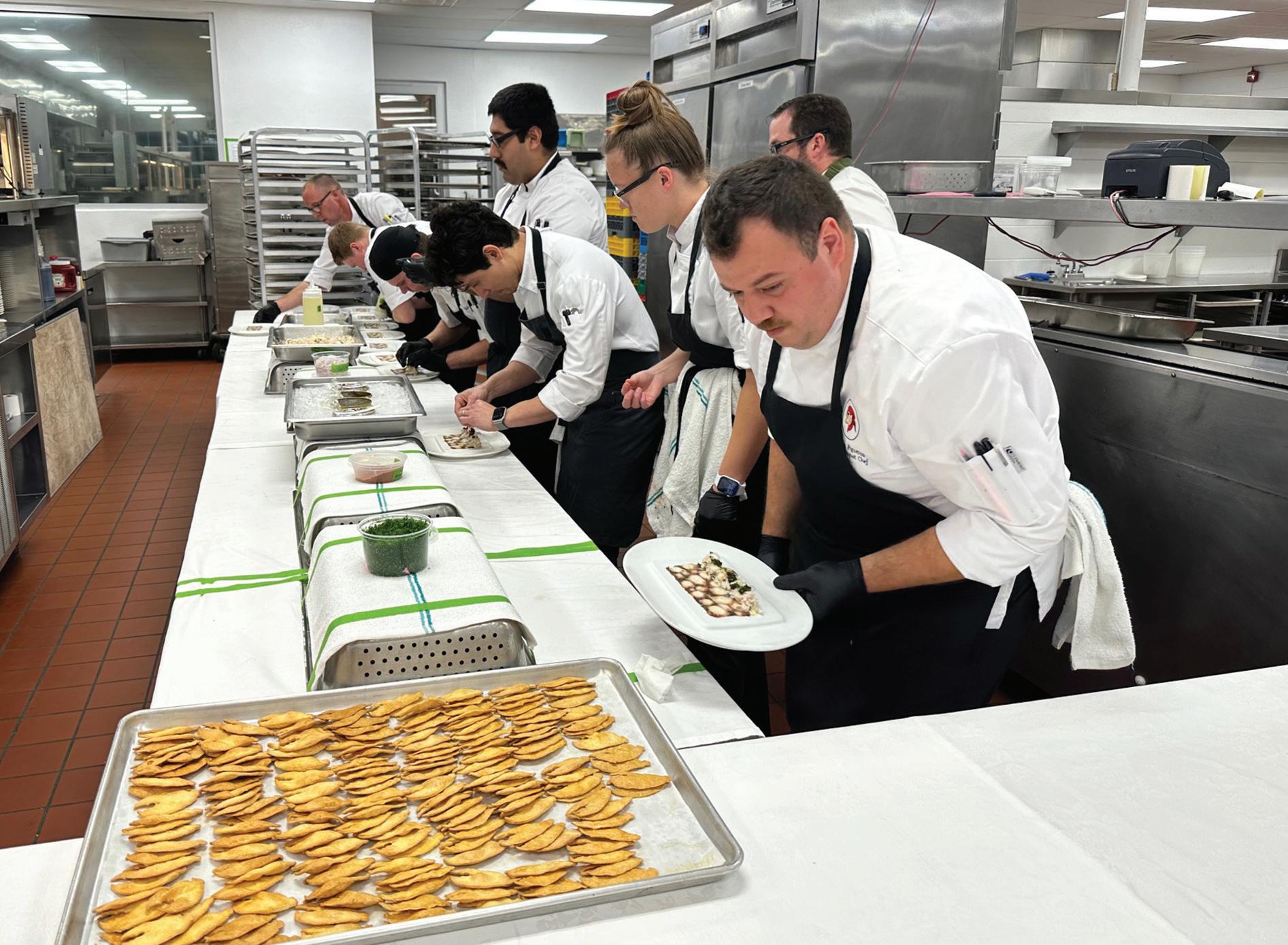
“We were still setting in when the storm became a real threat to the island,” he says. “We decided to wait it out in Miami.”
By Joanna DeChellis,Days later, Marchesano and his team returned and evaluated the devastation caused by the hurricane. Roofs were gone. Buildings were leveled. The golf course would need an entire year’s worth of repairs. There was no power or water. Cell service was spotty at best.
Despite a challenging start to his first Executive Chef role, Nick Marchesano is poised to further enhance The Gasparilla Inn & Club’s culinary program while recruiting and training the next generation of cooks.
Editor
It would be easy to leave this scenario and find a new opportunity elsewhere, but Marchesano was committed not only to rebuilding the Inn, but also to the community his members and guests call home.
The Gasparilla culinary team set up a community kitchen for seven days to feed neighbors and emergency response teams. They offered fresh water, meals and other supplies.
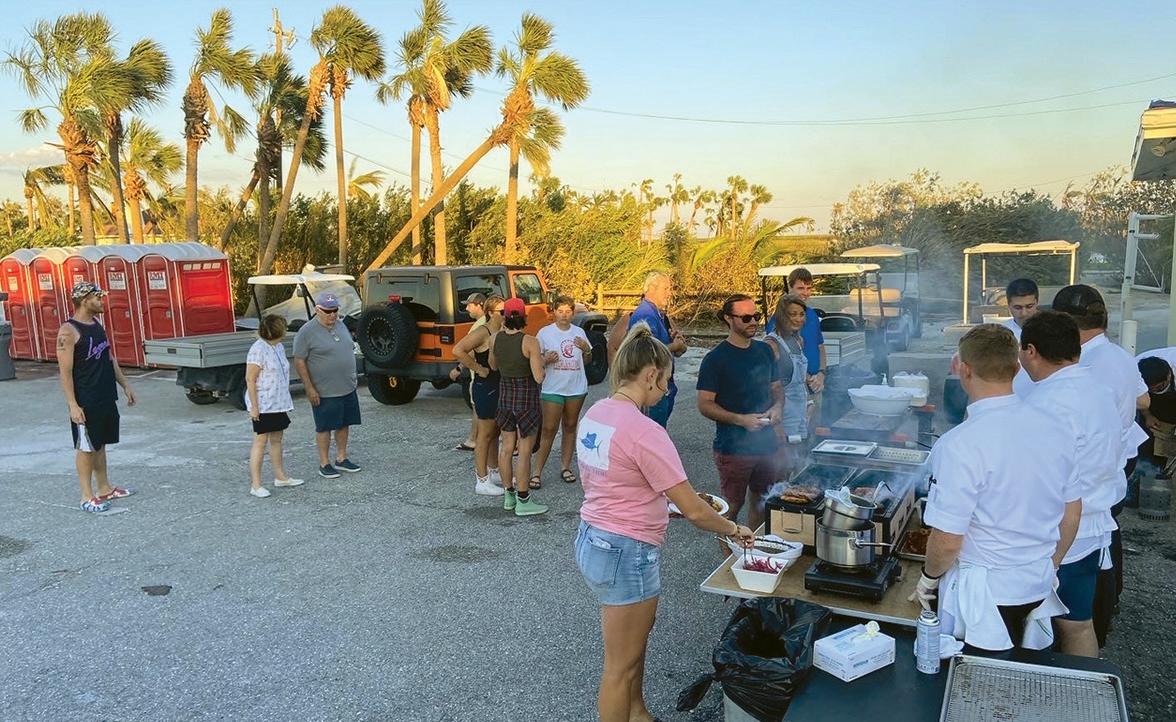
“We wanted to help with disaster relief, but we aren’t firefighters,” says Marchesano. “Instead, we did what we knew would be most helpful—we cooked for our community.”
Club + Resort Chef (C+RC): What you did in the storm’s aftermath is inspiring. Was it difficult?
Nick Marchesano (NM): Sure, but reopening The Broadmoor (Colorado Springs, Colo.) after COVID was far more challenging.
C+RC: How many people did you serve during those seven days?
NM: At first, we only served about 50 people, but by the end of the week, we were serving 250 daily. We served from the back loading dock, using every piece of portable banquet equipment we have. One night we served an Indian curry; another night we did tacos on the grills. We tried to be creative and resourceful.
C+RC: What happened when power was restored?
NM: We shifted gears and returned to preparing for the upcoming season, though we continued to feed the contractors working to repair our property. The Inn decided to push the open date back to December so we could make the needed repairs to our buildings, which was a blessing in disguise. We were able to have a fresh start, wipe away bad habits and begin again.
C+RC: How’s it going so far?
NM: Super smooth sailing. Fortunately, I brought several cooks from The Broadmoor, so a large part of my team is used to a rigorous culinary environment. The Broadmoor essentially trains chefs to run their own hotel operation— so running the culinary program here at Gasparilla is not much of a stretch.
C+RC: You’ve worked in high-profile operations like The Broadmoor, Augusta, Kiawah Island and others. You also have some very well-respected mentors, like John Johnstone, CMC. What have you learned from these places and people?
NM: The future of the culinary industry depends on chefs teaching and training others in an environment where growth is possible and encouraged. It’s not enough to brand your operation with an empty slogan like, ‘It’s a pleasure to work here.’ That won’t bring cooks in the door.
Our industry has a unique opportunity to bring people into our kitchens that we might not have targeted before. Our future depends on chefs helping those individuals build their careers through proper training, growth and by offering an experience they can’t get elsewhere.
C+RC: What does that philosophy look like at Gasparilla?
NM: We are actively recruiting tech and high school students—and I’m not looking for the best and most qualified candidates. I actually want the least qualified candidates. It doesn’t matter to me if they don’t know how to cut an onion properly. I can teach them that, and when we start at square one together, we build a skill set we are equally invested in.
C+RC: What challenges come with bringing in such novice team members?
NM: These kitchens are busy, and we don’t want to it be too intimidating and scare them away. We want to expand their view thoughtfully. We start with how to cut an onion and how to slice garlic and build from there. We put effort into training. It takes valuable time, and it’s hard to slow down to explain why something is right or wrong. But it’s well worth our time and theirs.
C+RC: This is your first Executive Chef title. Why did you choose Gasparilla?
NM: This property has benefited from a long line of talented chefs. From Peter Timmins, CMC, to Seth Shipley, CEC, CCA, to others. When the opportunity arose, [John Johnstone, CMC] encouraged me to apply.
C+RC: Now that things are settling down, what’s next?
NM: I want to continue to push the culinary envelope of what’s possible here at the Inn, and I want to create an apprenticeship program. C+RC


of rotating seafood options for the club’s 1,300






of culinary tightrope-walking, but when it comes to seafood, they take their balancing acts to new heights.
Certain ingredients—like salmon and scallops— must always be o ered, but diverse options from the vast array of available seafood are becoming more prevalent in clubs across the country.
The menus at Marco Island, Fla.-based Hideaway Beach Club’s three restaurants feature a range
members, including a sushi menu in the club’s lounge. Annual food-and-beverage revenue is $3 million, and seafood accounts for 47% of total sales.
“When something becomes available that members may not have seen, we try to bring it in and o er it on our fresh catch or daily features,” says Hideaway Executive Chef Timothy Smith.
Among the most successful species are parrot fish, Kona kampachi, triggerfish and any species of fresh

chefs must satisfy members’
while navigating uctuating supply chains and costs and providing diverse options from the vast array of available seafood. C+RC Editorial Report
grouper, such as yellow edge and strawberry, says Smith. Razor clams, however, “did not sell well.”
Smith changes 20% of each menu every three weeks, rotating through the restaurants, so every week is an opportunity to o er something new.
A bit of engineering has been necessary to overcome shortages, he adds. “Our menus change so frequently that we can work around shortages with each turn.”
Mainstays on Hideaway’s menu include the grouper “Oscar” and lobster bisque.
According to Smith, sustainability always factors into his menu-writing. “We like to know where our ingredients come from, so we use responsible purveyors and stick to products we are proud to talk about,” he says, such as Verlasso salmon and yellowtail snapper from the Florida Keys.
Cost can be a challenge, Smith notes, but he and his sta have managed to mitigate most supply chain disruption.
“We rely on a large list of purveyors,” he says.

Over his two years as Executive Chef of the 450-member Waldorf-Astoria Monarch Beach Resort in Dana Point, Calif., Jean-Pierre Dubray has tried to introduce more diverse species of seafood to members, “but guests aren’t always willing to try unfamiliar items.”


Dubray says cod has fared relatively
well—monkfish less so.
The resort has four restaurants, six bars and a large banquet facility. The annual food-and-beverage revenue is $60 million. The restaurants’ menus change twice a year, with year-round daily specials.
The resort’s Bourbon Steak restaurant features appetizers like ahi tuna tartare with Asian pear, pine nuts, Scotch bonnet, mint and sesame; and grilled Spanish octopus with chickpea purée, pomegranate glaze and ras el hanout. Entrées include Maine lobster pot pie with seasonal vegetables and brandied lobster cream and broiled New Zealand tai snapper with gingerscallion and fermented black beans.
Seafood items on the resort’s a la carte menus that Dubray considers permanent features are sea bass, salmon and crab.
Like Dubray, Executive Chef Matt Maryjanowski says monkfish moves slowly at Brook-Lea Country Club (Rochester, N.Y.). However, he’s found success with black cod.

Permanent fixtures on the club’s menus are calamari, haddock fish fry and scallops, all of which which help drive the club’s $1.8 million annual food-and-beverage revenue.
If availability issues arise, says Maryjanowski, members understand supply chain and pricing issues and give the
culinary team leeway.
At Bentwater Yacht & Country Club in Montgomery, Texas, Executive Chef Timothy M. Oltz says he hasn’t “encountered any issues getting the fish we consistently buy, but sometimes, as we prepare for wine dinners, vendors will say they can get what we are requesting—then a week to five days before the event, it’s no longer available.”
Salmon and scallops are staples, says Oltz. And members “seem to enjoy redfish dishes of any sort” for Friday specials.
The club’s Crescent Grille & Patio features grilled mahi-mahi in a sauce of tomatoes, onions, olives, capers, garlic, lime and pickled jalapeño; seared sea scallops with a brown butter; and ancho-crusted salmon with yellow mole. C+RC
 Timothy Smith, Executive Chef, Hideaway Beach Club
Hideaway Beach Club’s ‘angry lobster mac n cheese’
Timothy Smith, Executive Chef, Hideaway Beach Club
Hideaway Beach Club’s ‘angry lobster mac n cheese’
PLATED PASTRY, TAKE A NUMBER. Order-ahead chocolate sou é and tableside Bananas Foster may have their ‘wow’ factor, but lately, showstopping dessert boards are creating a buzz that commands more attention. What started as a social media sensation has since turned into an in-house dining experience that enables pastry chefs to create themed dessert displays with a variety of textures and flavors in one convenient setup.
Theresa Brauer, Pastry Chef of the Country Club of Virginia in Richmond, understands the impact of a satisfying end to a meal, especially one that allows diners to indulge their senses as a group. It’s the very reason Brauer relishes making dessert boards for club members and guests. “They allow people to gather and try many di erent things instead of sticking to one dessert,” she says.
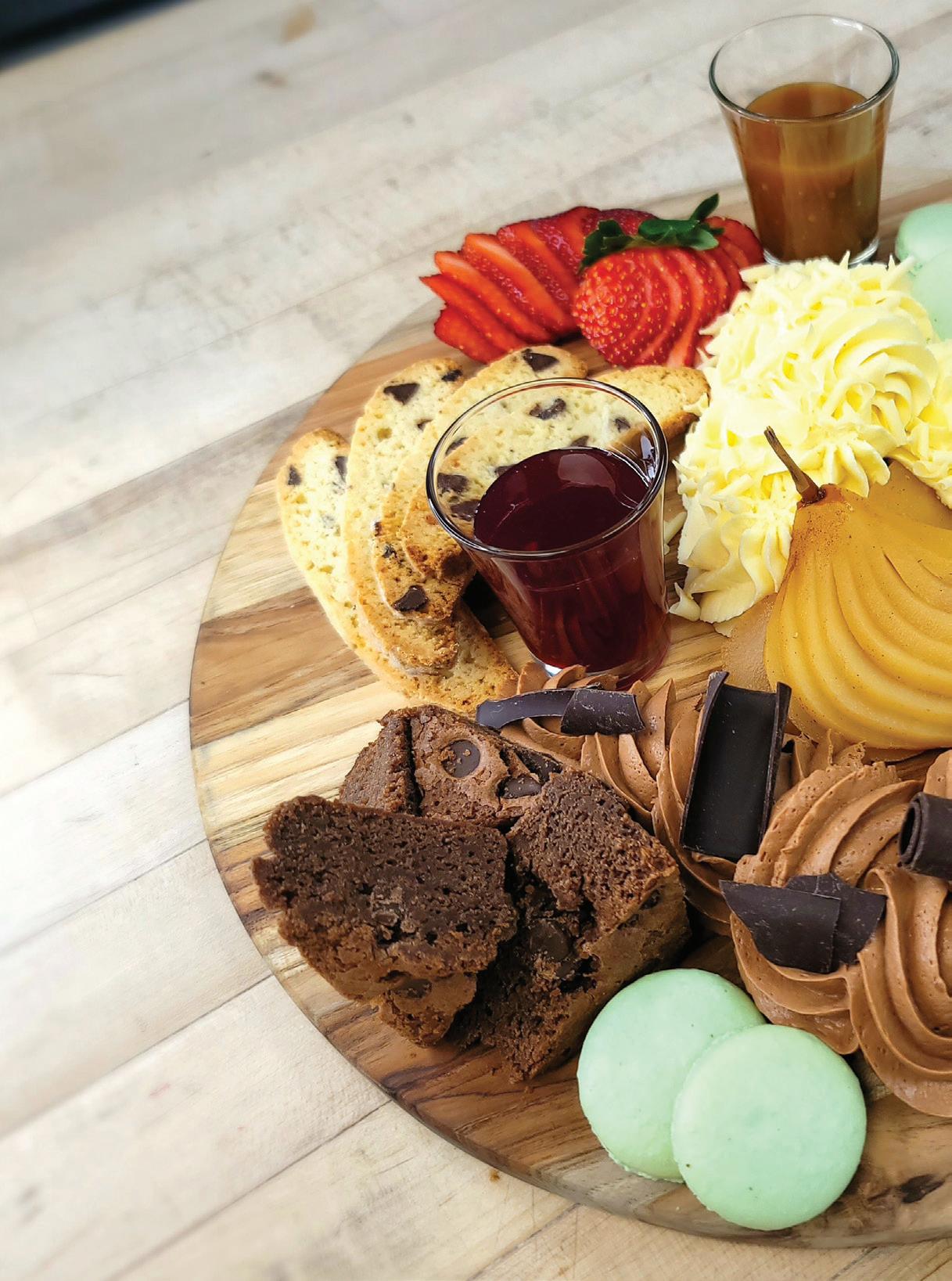
Brauer has been experimenting with dessert board concepts for the past two years, representing a new chapter in her seven-year-long stint at the club. She credits Janice Wong, a pastry chef in Singapore she follows online, for alerting her to the initial idea. And while dessert boards have yet to become a menu mainstay, Brauer finds fun ways to incorporate them into her banquets and special events lineup.
One of Brauer’s more popular boards is a chocolate mousse duo (dark and white chocolate), complemented by various toppings and bases. These include almond chocolate biscotti, chocolate chip cookies, macaron shells, vanilla-poached pear, strawberries, amaretto oranges, caramel sauce and a raspberry gastrique (pictured above). This past New Year’s Eve, she
created a DIY dessert board for the club’s restaurant, Ollie’s, which was a big hit. Members were given a bowl of pudding they could decorate with any toppings, including Oreo crumbs, mini cookies, peppermint crumble, fresh strawberries, crispy pearls and whipped cream. With these types of creations, Brauer has observed their universal appeal. “Dessert boards are for everyone; they bring a crowd together,” she notes.
Brauer is focused on balancing sweetness when preparing her boards, which requires thoughtful planning. “Just like creating a plated dessert, you need to lay out all your items and compare them between salt, sweet, acidic and bitter,” she notes.
boards have earned a spot at the table, giving members a chance to sample a variety of tastes in one sitting.
Theresa Brauer, Pastry Chef at the Country Club of Virginia (left), says creating a dessert board requires thoughtful planning. As with plated desserts, the board must strike a balance between salty, sweet, acidic and bitter avors.
“The best part of our job is creating that balance and knowing you hit those points. It brings an extra scientific element to creating the boards.” She typically starts with the main idea, assembles a list of possible ingredients, and eliminates any that don’t mesh well with the concept.
Brauer is excited by the dessert board possibilities in the coming months. “Spring is one of the best times for the boards—so much color and fun flavors to work with,” she says. She plans to incorporate macarons into a fun dessert board on the bu et table for Easter. For Mother’s Day, a pound cake dessert board will be enhanced with several
toppings, such as macerated raspberries, vanilla bean Chantilly, salted caramel sauce, sweet lemon butter, sliced mangos, chocolate fudge sauce, graham cracker crunch and toasted almond crackers. “It’s a fun way to incorporate every flavor for every dessert lover,” she says.
At Arrowhead Country Club (Rapid City, S.D.), dessert boards are a hot commodity, and Pastry Chef Kristen Belan knows how to respond to increased demand. “We host numerous events and banquets throughout the year. Any time a guest wants a petite dessert display, they want a board,” she says.

Before taking charge of Arrowhead’s pastry production, Belan perfected her craft as a pastry caterer in Atlanta, enabling her to transition into the private club scene smoothly. “I’ve been making dessert boards since the woodcutting board became popular,” she says. “I love catering, and setting up edible displays has always made me happy.”
In Arrowhead’s kitchen, dessert boards showcase Belan’s talent, particularly in pairing pastries with flavorful extras.

“If I have specific desserts I know I’ll be working with, then it’s fun to add bits of caramel and roasted fruit to enhance pretty much everything,” she notes. “Who doesn’t love a dip?” Tried-and-true favorites include lemon curd, Chantilly, caramel and roasted fruit.
While a la carte dessert boards are not currently on the menu, Belan expects that may soon change. She now enjoys pairing fresh fruits with salty components: “They make for colorful accents and textural variation.” Currently on the roster is a southern-inspired treat board, complete with bananas Foster pudding, blueberry buttermilk panna cotta and fried peach empanadas, which is finding favor with adults and kids alike. She is also incorporating pudding, empanadas, and pecan pie bites into a dessert “flight,” garnished with fresh fruit, nuts and cheese cubes.
Belan will continue to stay true to her Georgia roots this spring with some holiday-themed selections, with Mother’s Day and Easter brunch being two of Arrowhead’s more popular events. “I plan to keep with my regional trend
by adding lemon meringues and carrot cake to my list of southern sweets,” she says.
Long before dessert boards became a social media sensation, Rebecca Freeman, CEPC, Executive Pastry Chef of the Club at Las Campanas in Santa Fe, N.M., was on the case. “There was definitely a need for a shared dessert, and a board filled it perfectly,” she recalls of her first creation in 2019.

Freeman has since mastered the art of assembling a perfect pastry board. But rather than setting out with a specific plan to make boards, the process happened organically.
Freeman recalls her executive chef asking her to whip up something on the fly when special guests were dining, or a kitchen order needed fixing. “I would just put something together that sounded delicious to me: either multiple desserts or a sweet charcuterie board,” she says.
Aside from their visual appeal, dessert boards enable simplified sharing, which allows members to enjoy dessert without the pressure of selecting a single item individually. One of Freeman’s more recent memorable boards was a funfetti-style birthday cake with orange segments and hazelnut brittle.


Freeman tunes in to what she’s currently craving when developing dessert board ideas. On a recent trip to her native Chicago, she returned to the club with popcorn on her mind.
“Maybe I was feeling homesick, but I made a board with cheesy popcorn, salted caramel sauce and chocolate cake,” she says. “It sounds weird, but I promise the flavors worked.”
Other equally addictive, display-worthy creations include a chocolate fondue board with cookies and fruit for dipping and a fruit-centric ri on crème brúlée, starring orange segments and bananas. “I think it adds a nice, bitter caramel note,” Freeman says, “with a slight char of dark caramel.” C+RC









CATERING FOR A LARGE, post-game crowd is a challenging feat. Banquet chefs must execute flavorful food en masse while maintaining excellence for members and guests. Factor in the rising cost of goods, limited sta ng and other myriad challenges, club culinarians must become adept at spinning plates—and make sure they don’t come crashing down around them.
With spring on the horizon and event season ramping up, banquet managers and chefs are perfecting their game plans for tournaments, charity events and other functions that cement a club’s reputation within the community and drive business.
Managing catered golf events at Sedalia (Mo.) Country Club is a full-time job. According to General Manager Wayne Ogle, the club hosts approximately 20 golf tournaments per season, along with up to 60

events that are members-only. And that translates to a need for keeping a firm handle on a busy banquet operation.
While Ogle is a relative newbie at Sedalia—this July marks the one-
year anniversary at his first-ever club management role—he’s no stranger to the foodservice industry. As the former co-owner of a food truck that shuttered in 2020 due to COVID, Ogle’s honed the skills needed to pull
Whether teeing up for a good cause or a tournament, club members count on chefs who can pull o a crowd-pleasing meal.Sedalia CC’s calendar features dozens of events that include a meal. The club hosts approximately 20 golf tournaments per season and up to 60 members-only events.
o a well-oiled operation. “I understand food cost and breaking down a menu, minimizing inventory and having strict portion-control standards,” he says.
On any given day during prime season, Sedalia’s event calendar teems with golf outings that include a meal. They typically have 6-10 one-day fundraisers, six multiple-day events, a high school state championship (held in spring or fall), and two college events. On top of all that, the club is also involved with the Missouri Golf Association and is slated to host its Senior Series Tour in June. As a result, this event roster amounts to a total cover count that can reach up to 250.
When executing catered golf functions, Ogle must ensure that the club meets its standard of excellence, which means sta ng appropriately— something that continues to pose a challenge. “We need to have enough employees to handle our largest event, but not so many that their position provides too little to them without these large events,” he says of striking a balance with his F&B hires.
To make sure that events go o without a hitch, Ogle keeps the lines of communication open, not only with his sta but also with his guests and members. This includes anything from disruption of normal service to limited
seating and menu options.
Taking this same level of transparency into 2023 is vital to sustaining Sedalia’s golf event catering for the long haul. For Ogle’s kitchen, that means keeping a close eye on rising food costs and adjusting the menu accordingly. “Some of our most popular items [such as crab legs] have become so expensive, we have chosen to quit o ering them,” he notes. And when it comes to meat, because the club only serves USDA prime beef, this year’s menu reflects a necessary price hike.
Among the myriad functions held at Maple Blu Country Club in Madison, Wisc., golf events represent a respectable portion of the club’s catering business. According to Events Manager Janet Knoeller, the breakdown is as follows: golf functions (20 percent), charity events (10 percent) and tournaments (5 percent).
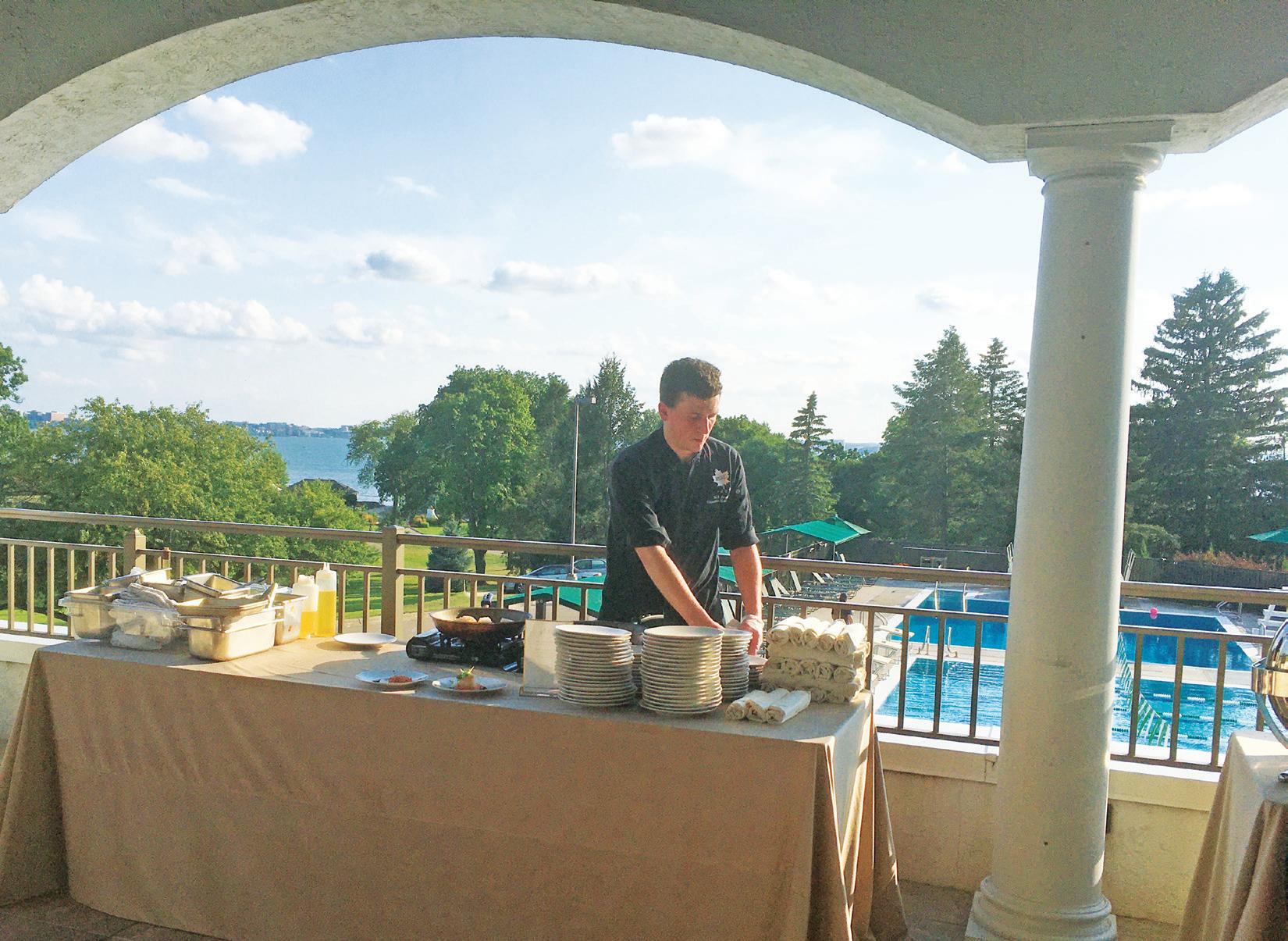
Since she started in the summer of 2021, Knoeller has familiarized herself with the needs of her clientele, often serving as the liaison between them and the catering team.
With over 25 years of experience, Knoeller has become adept at managing all challenges when running an event. But perhaps the one constant
that she, like others in her position, must accept—good or bad—is the midwestern weather. “On the occasions when we have all of or part of our catering outside, we have an indoor back-up plan or, at a minimum, an outdoor roofed or covered area backup plan,” she says.
Even with contingency plans, catering a large-scale golf event still has hiccups.
Knoeller finds patience and communication to be the best courses of action when things go awry. This approach applies not only when working with the client but also with her sta .
“I like the structure of creating and discussing deadlines and best practices with team members and sticking to them,” she explains. “If something happens outside the deadline or best practice, I like to ask about and discuss this with a ected team members and then decide together if it’s okay to make the exception.”
Leading by example, with input from the catering sta , is an e ective strategy that Knoeller will use for the coming season. With a full roster of events on tap from May through September, she keeps a close eye on the calendar so that she can plan accordingly.
At Seven Springs Golf & Country Club in Trinity, Fla., the relaxed vibe during tournament season carries over to its menu. The semi-private facility, sporting two courses, hosts between one and three monthly tournaments, with most events occurring between September and May. “Almost all tournaments play as a fundraiser for a charity, but we have some play for various groups,” says Director of Special Events Carol Vespa. For instance, a local high school might host a golf function, with proceeds going toward new sports equipment.
Regardless of the event’s purpose, Seven Springs o ers a bu et menu specifically for golf tournaments. Options include the All-American (hamburgers, pasta
salad, coleslaw and cookies); BBQ chicken (traditional cuts, along with baked beans, corn, salad and rolls); and pulled pork (with baked beans, salads and rolls). For parties wishing to eat before their game, the Sandwich Shop Bu et provides classic cold cuts with all the fixings, while golfers on the move can opt for the to-go boxed lunch.
“Our menu is very casual and geared toward a group of guys and gals who have been out enjoying the camaraderie the challenging game of golf brings them,” says Vespa. “They are just looking forward to coming in for a laid-back meal rather than a formal dinner.”
Because of the increasing demand from outside groups to use the facility for charitable tournaments, Seven Springs must weigh these
requests along with continuous member usage. “With the boom of golf due to the pandemic, we are much busier daily, and we need to make sure that outside events make the club money and do not upset our members by making the courses unavailable too often,” says Head Golf Pro Duston Haddad. Striking a balance between the two has enabled Seven Springs to serve the greater community while helping to sustain the club’s overall business.
This strategic approach to managing catered golf events continues to bode well for Seven Springs, where repeat bookings are common. In fact, many groups schedule their annual tournament before the last plate is cleared, ensuring that they leave the club well-played—and well-fed. C+RC

• Achieve long-term cold holding with or without grid electricity!























• Eleven sets of extruded aluminum pan slides accommodate 18 x 26” or 12 x 20” pans with ample capacity.




• Heavy duty all-terrain wheels, two with brakes, provide mobility when fully loaded and stability during even the roughest transport.




• Customize the door with your logo!





with 1,100 members and a seven-year waitlist, the pressure’s on to push the envelope at Forest Lake Club (Columbia, S.C.) while appealing to a diverse membership base.
“[Forest Lake] has a generational membership,” says Executive Chef Robert Meitzer, CEC, AAC, who was named one of the Club + Resort Chefs of the Year at the 2022 Chef to Chef Conference in Nashville. “It’s a mixed group.”

This can make menu planning a challenge. But Australian lamb, Meitzer says, appeals to all palates.
Lamb rack, in particular, is a musthave at Forest Lake, but the club also features lamb chop, shepherd’s pie, lamb ribs and lamb pastrami across its five dining outlets.
“The lamb rack has been on the menu for two years,” notes Meitzer. “It’s one of those items that we can’t take o ; members expect it in some
variation, whether as marinated chops or as a whole- or half-rack.”
It only made sense for Australian lamb to make an appearance at Forest Lake’s 100th anniversary celebration in January, too, where most members were in attendance.
“We made a braised lamb ragu with shell pasta using our pasta maker,” says Meitzer. “It was one of our most popular action stations.”
Forest Lake’s members love the mild, quintessential flavor of Australian lamb’s cuts, says Meitzer, and the size is just right: “not too small like a little New Zealand lollipop and not too big like some of the domestic lambs.” The price is right, too.
“We can get Australian lamb for about $19 [per pound],” he notes.

Meitzer also appreciates the sustainability factor. Because they graze on pure, natural grasslands throughout their lives, Australian lambs are lean and low in cholesterol compared to other animal proteins—yet full of flavor.
While Meitzer’s been in the culinary business for over 30 years, he began working with Australian lamb about 15 years ago while teaching at Johnson & Wales University.
The school utilized Australian lamb across all campuses, creating a competition called The Taste Down Under. Meitzer competed twice.
“The first time [I competed], I took second place. The prize was four days in Australia, cooking dinner at the Australian embassy,” he says. “The second year, I won the competition— and the prize was two weeks paid in Australia. So I cooked dinner in the Outback in Alice Springs, Australia, for a group of dignitaries.”
He’d planned to make them a Texas brisket but encountered a language barrier.
“I realized their definition of ‘barbecue’ and my definition were very different,” Meitzer says. “I was expecting a cold smoker kind of a barbecue, but in the Outback, when you say ‘barbecue,’ it’s a flat-top. I should have realized when the butcher gave me a strange look.”
Still, he says, “it was an eye-opening trip and a great learning experience.”
This past year, Meitzer participated in another Aussie event when Meat & Livestock Australia’s Aussie Beef & Lamb brand invited chefs from clubs across the country to participate in a two-day learning, networking, and culinary immersion event hosted at Ansley Golf Club in Atlanta, which culminated in a cooking challenge.
Meitzer was paired with James Patterson, Corporate Executive Chef of McConnell Golf and Executive Chef of Porters Neck Country Club (Wilmington, N.C.), to craft several dishes using
different cuts of Australian beef and lamb.
“That was a cool opportunity to bring different chefs together and into a kitchen,” says Meitzer. “There were some guidelines, but we had a lot of freedom to play around with the product and utilize cuts of beef and lamb that people aren’t as familiar with.”
The two created a tandoori ribeye with root vegetable curry and mint salad; a Thai lamb salad with ginger-carrot dressing and pickled mushrooms; and charcuterie with tartare, carpaccio, sausage and airdried beef (pictured above).

“Lamb isn’t often thought of on a charcuterie board,” Meitzer notes, but the dish was well-received by Ansley’s members.
Meitzer says the tandoori dish was inspired by what he foresees as a major culinary trend: Indian-inspired cuisine,
which Meitzer predicts could begin to overshadow other consumer favorites like Thai.
At a recent board dinner, he crafted 15 different South Indian dishes, including a lamb vindaloo.
Ultimately, Meitzer’s all about exploring global flavors and cuisine, demonstrating new and innovative ways chefs can showcase a memberfavorite ingredient like lamb.
And while lamb might traditionally be considered more for fine dining, Meitzer’s been incorporating cuts like lamb shoulder or leg into more casual dishes, including a gyro pizza at Forest Lake’s pool area.
“I added a bit of mozzarella, tomatoes, black olives, and I flashbaked the pita with the gyro meat,” says Meitzer. “I topped it with tzatziki and chopped mint when it came out. The members loved it.” C+RC


New York natives Nick Markel, GM/COO, and Joe Piazza, Executive Chef, are evolving the Country Club of Bu alo’s culinary program, thanks to a newly renovated kitchen, restaurant pop-ups and more.


 By Isabelle Gustafson, Senior Editor
By Isabelle Gustafson, Senior Editor




TWO MONTHS INTO bartending for the Country Club of Bu alo (CCB), Nick Markel, CCM, CCE, changed his college major from art to hospitality.
“I fell in love with this industry,” he says. “[Since then], I’ve always dreamed of returning to CCB.”
Nearly 20 years and several prominent posts later, Markel returned to the club as General Manager and Chief Operating O cer.
The Country Club of Bu alo, based in Williamsville, N.Y., has 505 members and does about $2 million in annual food-and-beverage revenue.
Markel says the club’s tight-knit community and family-centric environment make it special: “Many clubs say that, but I don’t know how many hold true to that value as closely as CCB does.”
This also attracted Executive Chef Joe Piazza, CEC, AAC, CCA, says Markel, and is what makes the two an ideal pairing.
“Chef [Piazza] is from Rochester, and his wife is from Corning—both close to Bu alo,” notes Markel. “He chose to come to CCB to be near their families. That says something about his values that I appreciate.”
Club + Resort Chef (C+RC): How would you describe CCB’s food-and-beverage operation?
Nick Markel (NM): We have one main dining site year-round, The Terrace, with doors that open to the elements on beautiful spring and fall nights. We also open a separate, outdoor dining facility called The First Tee during summer. Then we have our halfway house and our pool snack bar.
Chef Joe [Piazza] is wonderful. As a club with a smaller membership, we’re able to personalize each dining experience. Chef and his team go out of their way to make members happy. For example, one of our members loves pork chops. We don’t always have a pork chop on the menu, but we always have pork chops in the fridge ready for her whenever she cares for one.
C+RC: What is Chef Piazza best known for as a culinarian?
NM: He is incredibly talented, and he’s had an amazing career at several prominent clubs.
From a sta perspective, he’s known for having a steady hand and is great at mentoring young culinarians.
From a membership perspective, he’s known for consistently excellent food and creativity.
He’s always looking to push the envelope and try new concepts. To mix it up for the membership for the next six weeks, he’s running a pop-up restaurant in our main dining room: a northern Italian steakhouse theme with choose-your-own charcuterie boards and wine flights.
We’ve done pop-ups for the past three years. The past two have been the Italian concept. The year prior was contemporary American small plates. [Piazza] always knocks it out of the park.
C+RC: How else has the F&B program evolved since Chef started?
NM: One of the biggest changes was the shift to monthly menu changes. That was a phenomenal upgrade for the members, who spend a lot of time at the club. We have to keep things fresh, which Chef is committed to.

The culinary team does a wonderful job coming up with new events. One of the things that came out of COVID was our Twilight series: a series of menus paired with wines and served on our North Lawn area, open to a limited
group of members. It’s very popular. We run three or four through the summer; they always sell out.
We just completed a $1.2 million kitchen renovation. We added space for chef’s tables, about 10-12 per year, as part of the renovation. We call it Table 101, and it is an outstanding culinary experience that our members can’t get anywhere else—and an opportunity for Chef [Piazza] to showcase his talents.
C+RC: What were the primary goals of the remodel?
NM: We had an aging kitchen that needed an upgrade. [Changes included] new flooring, wall coverings and new equipment.
I’m especially proud of the board for approving additions to the original budget that allowed us to choose [more ergonomic] flooring. We also added a DOAS (dedicated outdoor air system) unit that maintains an environment in the kitchen of around 75°F.
[Piazza] did a great job managing that project. My role was shepherding the project through: getting a successful vote from the membership, getting that funding and supporting him through the construction process to make sure everything was going according to plan and that he was happy with it.
At CCB, we want all department heads to have the autonomy to run their programs as they see fit. I’m not an expert in anything, but I do my best to give each leader the necessary resources and support. C+RC
Chef of L’Hirondelle Club of Ruxton (Towson, Md.), learned his fiancé was pregnant, he began to prepare for the arrival of their new addition. He planned to take at least a week o after she was born, but he could take up to two weeks per the club’s paternity leave program.
When Garrish’s daughter, McKenzie (see photo, above), was born two months premature, he faced a daunting set of unexpected challenges. Fortunately, L’Hirondelle was supportive, providing him the time and flexibility he needed to navigate those early days.

“I was able to bounce back and forth between the hospital and the club daily,” says Garrish. “When she finally came home, I could still take a week o to be with my family. A lot of the credit goes to my team, who was able to step up in my absence and fill in any gaps.”
L’Hirondelle continues to support Garrish—but not all employees in the club industry are as fortunate.
According to a report by the National Partnership for Women & Families, only 25% of workers in the United States have access to paid family leave through their employer.¹ According to the U.S. Bureau of Labor Statistics, only 10% of workers in the accommodation and foodservice industry have access to paid family leave benefits.²
“Our industry is already tough on hours and lacks flexibility,” says Eduardo Castillo, CEC, Executive Chef of San Antonio (Texas) Country Club. “Parental leave can be expensive, but it provides an avenue for clubs to maintain sta and provide an environment that is welcoming and receptive of families.”
SACC o ers two weeks of paid time
o (PTO) after one year of employment at the club. That number inflates to six weeks after 10 years. But that’s not ideal for younger parents without much tenure.
“We had a new employee have a baby in his first year, and he had no PTO to cover time o ,” says Castillo. “Our employees generously decided to donate some of their own PTO, but he still had to take a pay hit.”
Castillo is working with SACC to find more and better ways to support new families and hourly employees during important life events such as the arrival of a new child.
“PTO is a good start, but it usually has tight limitations,” he says. “We need more support and guidance from club management to improve parental leave programs. Clubs could explore creating funds like scholarships or holiday bonuses to support parental leave for all employees. But that starts by having
As clubs evaluate their employee benefi ts packages, parental leave can offer an opportunity to drive recruitment and retention while improving productivity.
those conversations with management and the board.”
Another challenge facing club chefs is the long and irregular hours. Many employees work late into the evening or early in the morning, making it difficult to find childcare.
“Most SACC employees rely on family to help them care for a new baby, or they choose a daycare,” says Castillo. “Unfortunately, many childcare programs are expensive and often completely out of reach due to hours or cost. We try to explore each case as unique and find a solution that may include changing schedules, roles or expectations.”

When a leadership-level employee takes leave, it creates a temporary gap that needs to be filled. One e ective solution is to cross-train other sta
members to take on those responsibilities during their absence.
“Instead of looking at parental leaves as a challenge to overcome, we must look at it as an opportunity for employees to take on new tasks and responsibilities,” says Castillo. “When a manager is gone for an extended period, other employees can grow into that supervisory or senior role. A junior sous or chef de partie can take some or all of the responsibility of the executive chef who is out. This can also be an opportunity to cross-train employees.”
Cross-training gives employees valuable experience and skills and can create a more flexible and resilient workforce, allowing the club to better adapt to unexpected absences or changes in sta ng needs.
“You usually have several months to plan,” says Cory Kuhn, CCM, Clubhouse Manager of Glendora (Calif.) Country Club. “Before the birth of
each of my three children, I took the initiative to train my team to cover my responsibilities in my absence.”
When Kuhn’s first child was born, he was a banquet manager. He trained his banquet captain for several months on scheduling, setting up for events and more. “It was great because when I came back, my captain was proficient at my position, and we were both given promotions,” says Kuhn.
For each subsequent child, Kuhn followed a similar plan. “This has been a great way to train and delegate tasks to other aspiring managers who might not have had the reason or direction to do so if it had not been for me leaving temporarily,” he says. “The experience also provides a valuable lesson in delegation and letting your team do the work without being micromanaged.”
While each club takes a di erent approach to parental leave, the prevailing theme distills down to this: A supportive work environment values and prioritizes the needs of its employees and their families.

“We’ve worked hard to change how we help our team balance work and family priorities,” says Garrish. “My GM has been incredibly supportive of this process, too. When we’re most busy in the summer, we work five days a week. But in the winter, when we’re slower, we work four days a week and always try to give at least one weekend day o .
“If a member of my team has unused vacation at the end of the year, I’ll make them take time o ,” he continues. “I want my team to spend time with their families, have hobbies and a life outside the kitchen. Those things are important and help us serve our membership better.” C+RC
Editorial Note: Despite e orts to interview a wider variety of sources for this story, including female chefs and managers, all declined to participate.
Product: Marin Sling Adjustable Chaise
Features:
▶ Marin collection is inspired from the Northern California coastal community of Marin County, located just north of San Francisco’s Golden Gate Bridge
▶ Taking cues from both natural elements as well as modern design, Marin exemplifies the relaxed yet sophisticated nature of the area
▶ Sling is popular for outdoor spaces not only because it’s comfortable. It is also water resistant, easy to maintain, and does not tear or crack easily
OW Lee
www.owlee.com
Product: Summit Teak + Sling Stacking Chaise

Features:
▶ Sleek, low-profile teak frame supports an outdoor mesh sling for comfortable poolside lounging

▶ Polyester and poly vinyl sling material is waterproof, fade resistant and resists tearing or stretching.
▶ Select sling in Cloud, Taupe or Charcoal
▶ Backrest adjusts to four positions on stainless steel fittings, and back legs roll on discreet wheels.
▶ Teak chaise measures 26.5 inches in width by 78 inches in diameter by 11 inches in height
▶ Seat measures 23 inches in width by 46 inches in diameter

▶ Stacks up to 6 high
▶ Raditional mortise and tenon joinery combined with stainless steel hardware to ensure quality construction that will withstand a lifetime of use
Country Casual Teak
www.countrycasualteak.com
Product: Outdoor Furniture
Features:
▶ Your members deserve the very best when they set foot in your clubhouse
▶ Adding luxurious and durable outdoor furnishings from Landmark is a surefire way to ensure that happens
▶ Our dining tables and chairs create an inviting dining area for members to enjoy while our loungers and rockers can turn your patio into an oasis and highlight relaxation
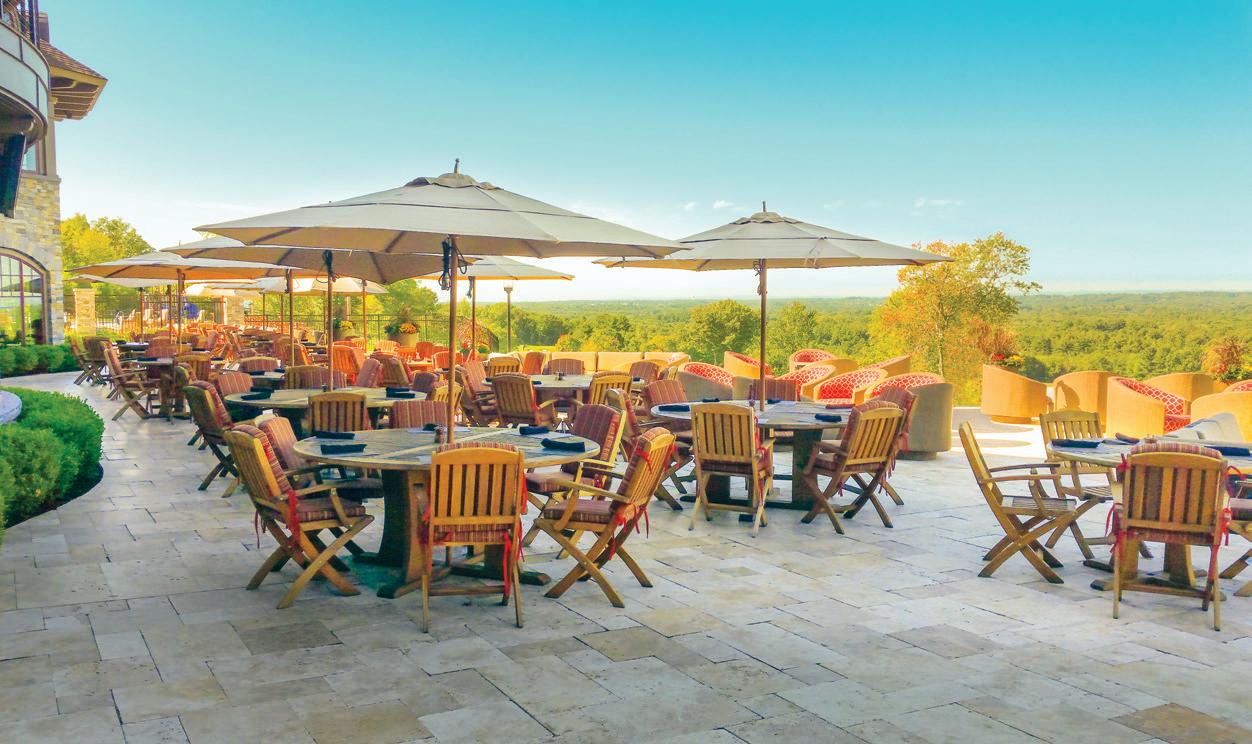
▶ Everything is made from our sturdy Rinowood material to ensure weather-resistance and longevity
Landmark Golf Course Products
Rinowood.com
1-888-337-7677
Product: CallButton

















Features:
▶ CallButton is an all-new mobile app designed to enhance the member and guest on-site experience at country clubs and resorts
▶ CallButton provides a suite of mobile capabilities at the fingertips of members and guests

▶ Maximize revenue and staffing resources, while enhancing customer experience across your entire property
▶ Benefits include:

• Food and Beverage sales with custom club and resort service area support
• Text/video chat support to encourage personalized and interactive hospitality service
• Mobile Concierge support







• Configurable amenity support such as valet request, curbside pickup, mobile wait list
CallButton.AI, Inc.




https://callbutton.ai
Product: KoldCube KCUA11
Features:
▶ Operates both indoors and outdoors
▶ The only refrigerated cabinet with 3 built-in power sources –Electric – Solar – and Battery

▶ Built for rugged transport
▶ Charge, then it’s ready to use off premises
▶ 4-6 hours of cold holding on a single charge
▶ Place your custom logo on the door for branded messaging Cres Cor www.crescor.com

Product: IntelliDash Irrigation and Fleet Management Platform

Features:
▶ New features make the one-stop-shop for golf course management platform even more appealing for superintendents and course managers
▶ Widget Lock/Unlock Button allows for customization of the dashboard by moving important information to the top of the screen
▶ Toro Irrigation National Support Network (NSN) Chat offers quick access to Toro’s trusted NSN support team
▶ Mobile-Friendly Design provides a seamless experience when connecting to IntelliDash via smartphone, tablet or PC

▶ Decision Tree (opt-in function) operates in conjunction with Turf Guard soil sensors to help determine when to irrigate
▶ Extended Free-ofCharge Offer through Dec. 31, 2023
▶ Users must have an existing Toro application that is integrated into IntelliDash to take advantage of this offer Toro toro.com/intellidash

Product: The Jenkins Barstool



Features:
▶ The Jenkins Barstool, by Eustis Chair, has clean lines, plenty of back support, and an optional upholstered seat and back
▶ It offers a contemporary design that is well-suited for banquet, restaurant, or member dining chairs
▶ Also available as a chair or a swivel barstool
▶ Every Eustis Chair product is proudly made to order in the USA




▶ Contact the Eustis Chair sales team at EustisChair.com to discuss your upcoming projects
Eustis Chair www.EustisChair.com

Product: Oars & Alps
Features:
▶ Stay Fresh With Clean Ingredients
▶ Oars & Alps leave out ingredients that strip skin of its natural oils, which can leave you dry and itchy
▶ Feed your skin aluminum-free deodorant that actually works
▶ Invigorating Shampoo + Conditioner are designed for ultimate scalp health and an energizing shower experience
▶ Oars & Alps Body Wash keeps your skin hydrated and fresh all day long

Fore Supply Co. www.ForeSupplyco.com
Product: Sunscreen
Features:
▶ Tri-C Club Supply - Duffy’s has all your sun care needs
▶ Exclusive Palm Island Sunscreen
▶ Available in gallon refills, pump bottles and sprays
▶ Light scent and fragrance free options
▶ Other sunscreen brands available including Bull Frog Mosquito Coast Sunscreen with insect repellent
Tri-C Club Supply Inc.-Duffy’s www.DuffysTriC.com


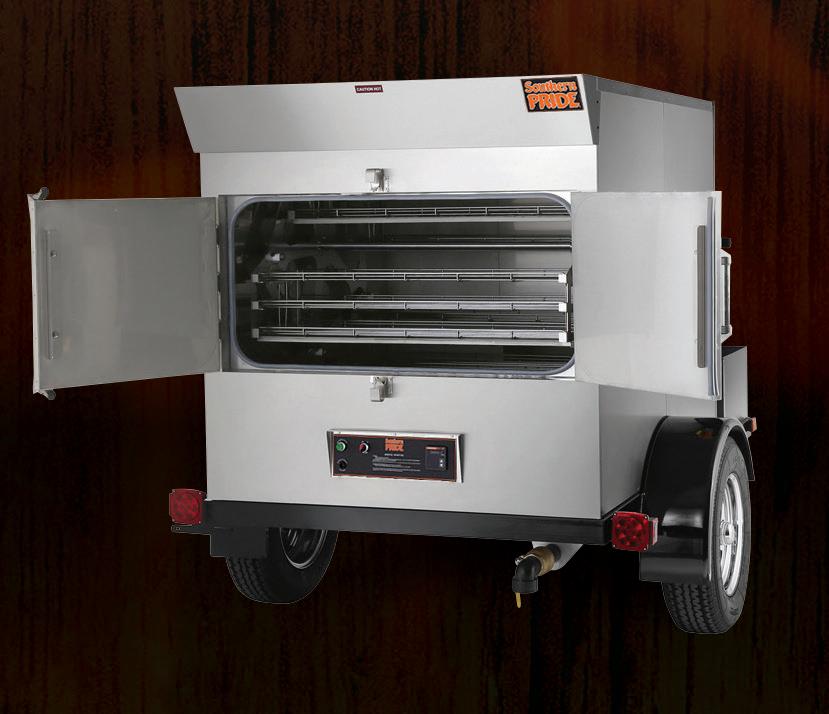












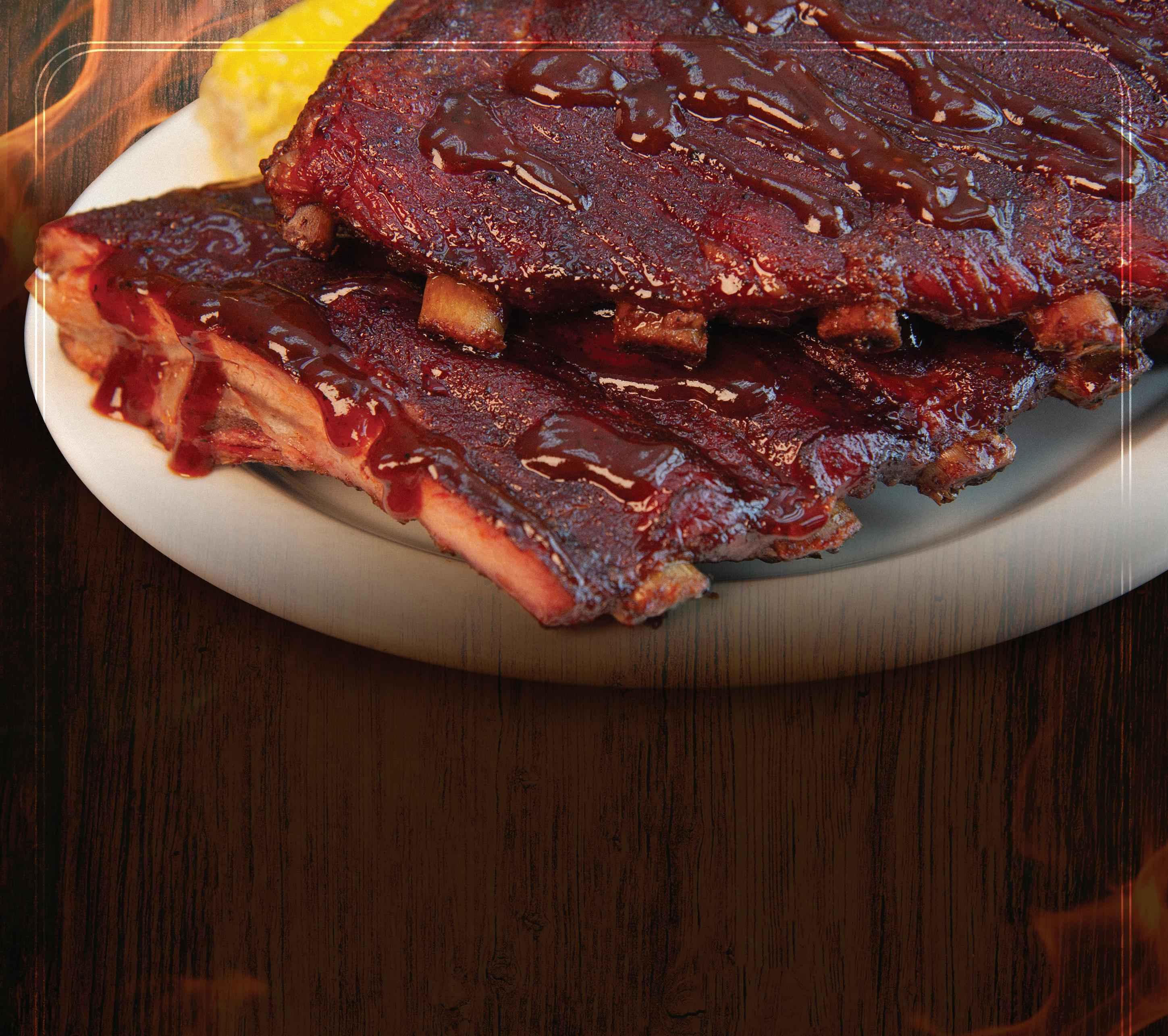


The Montague® Legend®





































































Steakhouse Broiler now with optional refrigerated base. This heavy-duty broiling center keeps proteins close at hand speeding up production, enhancing freshness and maximizing efficiency.



















Manufactured in the United States by skilled craftsmen, Montague Steakhouse Broilers offer chefs powerful, high-volume, heavy-duty broiling, producing tender, flavorful entrees customers will rave about. Now that’s perfection.






It’s time to discover Montague!
